#can’t believe there’s no Neil Gaiman on here
Text
Misunderstanding
I received a note from someone who was upset I “failed to cite Scott McCloud’s Understanding Comics” in my research for my work on Neil Gaiman's Chivalry and the essays I wrote about it.
I really appreciate that people want to make sure credit goes where it's due, and I have a lot of respect for Scott McCloud's accomplishment with his wonderful book.
I haven't read it myself in some years, and didn't cite it in my articles because I didn't reference it. I don't even know where my copy is so I don't know what McCloud referenced, either.
The information in my articles re: illuminated manuscripts and the Bayeux Tapestry, as well as other theories about the development of sequential art from prehistory, not only predate McCloud's work (and in fact, predate McCloud's birth,) but they are so common and so well known in comics circles that asking me to cite them seems as weird to me as asking me to cite the information that George Washington was the first President of the United States.
A part of me wonders if someone is trying to play, "Let's you and him fight."
No.
But I’m happy to bring to your attention some reading material.
Stephen Becker in his 1959 work Comic Art in America: A Social History of the Funnies, the Political Cartoons, Magazine Humor, Sporting Cartoons, and Animated Cartoons was among the first to discuss the Bayeux Tapestry as comic art. I read that book sometime in the 1980’s. I think a lot of people assume the Bayeux tapestry as comic art was McCloud’s idea, but we don’t all walk around with a reference library in our heads, so there you go. I can’t find my copy of Becker’s work to quote, but I did find an article by Arthur Asa Berger with a mention of the Bayeux Tapestry as comic art in the summer 1978 issue of The Wilson Quarterly.

My first exposure to the idea of comics as descendant of fine art was Maurice Horn’s 1976 The World Encyclopedia of Comics which was my first read re: comics history. I still have my tattered 1976 edition.
While Horn scorned the idea that tapestries and manuscripts could be comic art (see, it was a matter of discussion way back then, so much so that authors were writing snarky asides to one another about it,) he believed the origin of sequential art was in the Renaissance sketches of Leonardo da Vinci - which I think everyone now agrees is kind of a bonkers idea.

I think Horn was just intent on elevating the comic art form by hooking up with da Vinci.
You go, boi.
Comics as descendant of art on scrolls is a very common theory, the easiest to trace being in Manga! Manga! The World of Japanese Comics by Fred Schodt published in 1983 when I was still a teenager. I can't find my copy to show examples, but this text is still in print and you can go read it for yourself.
I was introduced to manga by cartoonist Leslie Sternbergh and bought Schodt’s book at Books Kinokuniya on (I think) a trip to New York around the time of first publication of Schodt’s work. And years later took a trip to Japan with Fred Schodt and a group of cartoonists including Jeff Smith and Jules Fieffer, Nicole Hollander, and Denys Cowan as the guests of Tezuka Productions.
Here we all are.
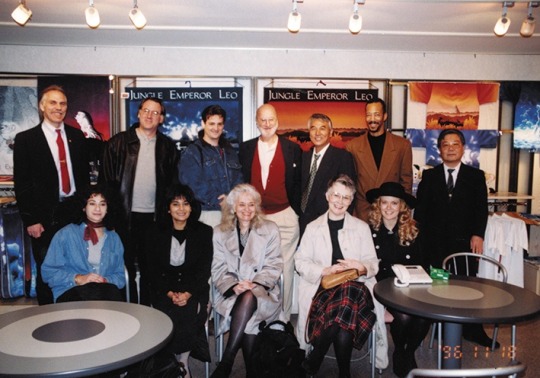
So, I’m familiar with manga, see.
As for comics as descendant of cave paintings, hieroglyphics and ancient art in general, Will Eisner’s 1985 Comics and Sequential Art not only made all of those points, but made those points with comic art examples. Like these.

And this.

And this.
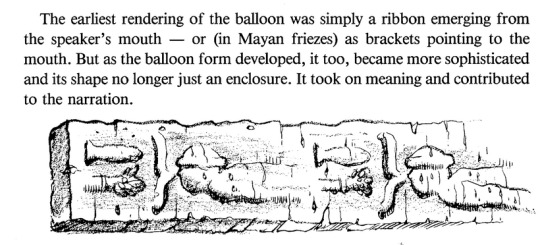
And more than a few words on this:

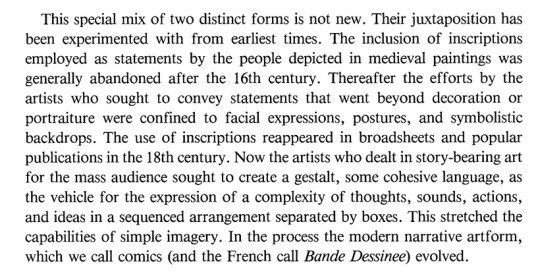
I find it amusing that someone is questioning why I didn’t cite McCloud when what you should probably be questioning is why more people don’t cite Eisner who produced his book eight years before McCloud published his and who is well known to have influenced McCloud.
Whatever. My book's autographed.
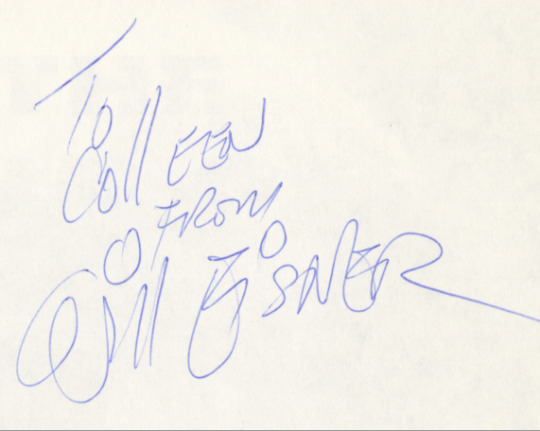
I also danced with Eisner. Eat your heart out.
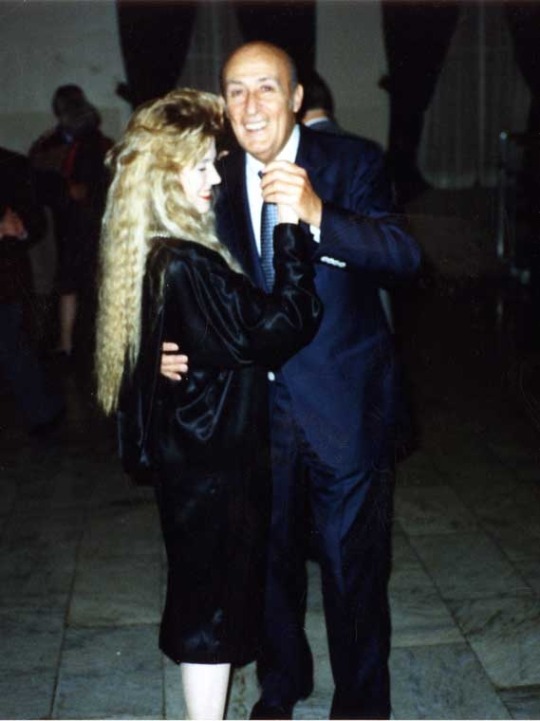
Understanding Comics is a terrific work with huge advantages over every book (that I know of) about comics that came before: it taught comics entirely in the language of comics.
But the discussion in it about the origins of comics and my work especially re: illuminated manuscripts/tapestries, did not originate with McCloud. I research illuminated manuscripts because it’s my hobby and it informs my art.
I encourage everyone to read Understanding Comics because it is an outstanding work.
But it’s not the book that introduced me to the concepts of the development of comic art. It’s not even the point of origin of those concepts. So, there is no reason to cite it.
Also, shocking as it may seem, I occasionally come up with ideas on my own. While I'm younger than McCloud, I've actually been a comics pro longer than he has. So I've had plenty of opportunity to, you know, read things and toss things around, and decide for myself.
When I first read Chivalry and first begged Neil Gaiman to let me adapt it, my head full of the work of Alberto Sangorski and his art for Tennyson’s Le Morte D’Arthur, Understanding Comics hadn’t been published yet.
It's been a good twelve years since I last read McCloud's work, and I don't think I've spoken to him five times in the last three decades. But I'm pretty sure he never mentioned Sangorski.
I hope that clears everything up, and maybe introduces some of you to some works you might not be aware of.
Have a great day.
#understanding comics#comics history#neil gaiman#scott mccloud#chivalry#jules fieffer#tezuka productions#manga#will eisner
2K notes
·
View notes
Text
Hey so here’s a really mean Sandman thought I had...
I just finished reading The Kindly Ones for the first time. (Yeah.) And I must say, it was a very interesting experience from the perspective of someone who both watched the show first and has also been hanging around deeply into fandom enough that I’ve absorbed spoilers/meta/whatever else surrounding the end of the comics before reading them to draw my own conclusions.
Now I have. And I think I’ve come to some interesting ones.
First off, naturally, Neil Gaiman has written the ultimate tragedy. Everything comes full circle, every decision made with the best possible intentions has the worst possible outcome, and it was always going to be this way. It’s a masterstroke, and as I read I was less sad than admiring at the completeness of it, the way everything slots into place so neatly.
Ever since I spoiled myself for the ending (which I’m glad I did,) I’ve read quite a bit of Kindly Ones meta. Many words have been spilled around the subject of “if someone had just SEEN what was wrong...” but MANY people did! Fiddler’s Green. Matthew. Nuala. And, of course, Hob, who Dream walks out on - again - because he’s being too perceptive. Again.
I was also reading the book with the foreknowledge that this is all an elaborate suicide plot on the part of Dream. After all, as Death says at the end, “the only reason you got yourself into this mess is because this is where you wanted to be.” And, later, when Dream says he has made all the preparations necessary, “You’ve been making them for ages. You just didn’t let yourself know that was what you were doing.” To which Dream replies, “if you say so.”
So we have lots of people saying lots of things about Dream, but what do Dream’s actions say for themselves? Because I must admit, reading the book knowing how it was going to end threw a lot of those assumptions into a new light.
Let’s go back to the conversation with Death. Dream says: “I did not plan this, my sister. I had imagined that I would be able to keep events here in check. I intended to play a waiting game, in which, ultimately, no harm was done.”

This I believe. One of the things that never sat right with me was Dream sitting back and letting his creations suffer, if his intention all along was to destroy himself. I don’t believe that’s in character for Dream in any incarnation.
What was Dream’s motivation? Dream is tired. He says so himself. He’s been tired for a long time, probably even before his imprisonment and having to basically remake the Dreaming and since then he hasn’t had a moment’s peace, what with Season of Mists and Orpheus and everything else. I think meeting Daniel planted the seed in his mind, that there was an out. As Death says, “...the stuff you do. Where you do it, and you won’t even admit to yourself it’s what you’re doing.”
Meeting Daniel was that moment for Dream. Someone who could take over his responsibilities in the Dreaming. He can’t just walk away, like Destruction and Lucifer. That’s not who he is. I think Dream’s plan was to wait for Daniel to grow up some, and then... something. ??? profit. Maybe he would’ve gone to the Fates himself and taken their punishment for Orpheus. (Because he does, as Nuala astutely points out, want to be punished for Orpheus).
BUT, Daniel gets stolen while he’s still a baby. So Dream sends Matthew and the newly-remade Corinthian after him. Lyta, meanwhile, instigates the Furies, so now they’re on a ticking clock.
(I don’t, personally, think that Dream freed Loki with the intention of setting all this in motion, but that’s up to reader interpretation.)
Dream makes preparations. It certainly seems like he’s making peace with the fact of his death. He visits Nada (a small boy in Hong Kong), does a census of the Dreaming, acknowledges his servants, feeds pigeons, examines his properties in the waking world, and reviews various treaties and agreements to which the Dreaming is subject. He is responsible. He’s getting his affairs in order in case things don’t fall the way he expects them to.
When his Griffin is killed, Dream tells Furies: “I can create another, who would not even know that it had ever died.” Cold, perhaps, but very in keeping with the type of backwards kindness we’ve seen from Dream throughout the series. He also says: “This is my world, ladies. I control it, I am responsible for it. You with neither destroy it nor will you destroy me.”
The last part, as we know, is simply true. The Dreaming can be restored endlessly, and even if the facet known as Morpheus is destroyed, Dream will continue. But it’s the first part that’s significant. I control it, I am responsible for it. That part says to me that he would not allow his creations to suffer. He is responsible for them. And yes, he could restore them with a thought, but why bother? If he’s trying to get himself killed, why doesn’t the story just end here and now? With the Furies and Dream alone in his throne room?
Clearly, he’s waiting for Daniel. He can’t allow himself to be removed without a successor in place. Once the Furies leave, he immediately calls Matthew for an update. Matthew comments on how cold Dream sounds - he’s feeling the pressure.
Fiddler’s Green is killed. Does Dream say “I can create another?” No. He immediately goes in search of Lyta, to hopefully negate the wrath of the Furies. A stopgap, as the Furies would find another avatar in time, but Dream is taking action. He is not passively letting his doom collapse around his ears.
He’s foiled by Thessaly (all my homies hate Thessaly). While they are estranged exes, Thessaly admits that protecting Lyta from Dream was “not entirely” to hurt him: she struck a deal with the Three for a bit more life. Hurting Dream was an added bonus. She knows Dream well enough that he won’t break the rules in order to kill Lyta.
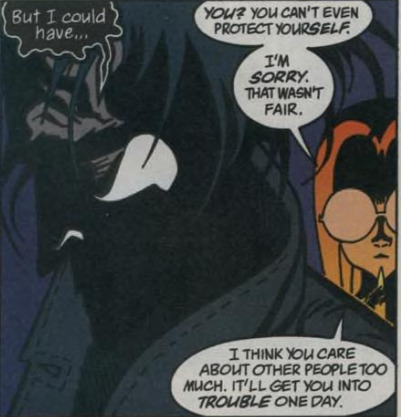
Dream is visibly upset by this. He won’t break the rules, but Thessaly’s actions (and his own, by extension) mean that more destruction will be wrought in the Dreaming. Lucien takes him to task for it:

Lucien asks why he isn’t restoring the things the Furies destroyed, but it makes sense to halt the source of the destruction first, rather than needing to fix things over and over again. Dream is at a loss. His plan was foiled and now he has no way to hold off the Furies. And Daniel is still missing. He could summon his sister right now (as he says, “by his own hand or another’s”) but that would leave the Dreaming in disarray, and he won’t do that.
Now to add Nuala’s summons into the mix. While Death will later point out that yes, Dream could have rejected the summons, I think it’s important to remember that he does actually try, at first:

“I must most earnestly beseech you...” That is begging. That is literal begging from Dream of the Endless, and it doesn’t stop there. “You do me a disservice, Nuala,” Dream says, after Nuala quotes his promise back to him. He tries to get out of it! But Nuala won’t let him, throws his words in his face, and thereby seals his fate. Because Dream of the Endless, if nothing else, keeps his word, follows the rules. As he says later: “If we did otherwise, we would not be ourselves.”
He can’t just leave his realm like Destruction. He can’t ignore the rules and kill Lyta anyway. He can’t go back on his word and reject Nuala’s summons. If he did that, he would no longer be Dream.

So, he sets Daniel up in his new role as best as he can with the time he has left, and then he takes his sister’s hand to prevent any further damage to the Dreaming. Death accuses him of planning the whole thing, and perhaps that’s true. Perhaps he saw where the pieces were laid on the board and manipulated them to his advantage. I certainly don’t deny that ever since Orpheus he had intended to take himself out of the picture, one way or another. But I truly don’t think he meant for it to happen like this. I don’t see him as a cold-hearted chessmaster, forcing himself into a corner until he has no way out, with his creations’ existences hanging in the balance. I think he had a plan, and tried to stick to the plan as best he could, as the true tragedy spun into place around him: it was always going to happen like this.
Are y’all ready for the mean thought?
Because thinking about it this way, if truly all he wanted was a way out, he could have expedited the process at any point. As I hope I have shown here, to the contrary, his behaviour reads to me as someone who held out until the absolute bitter end, until he literally had no other choice. What are we to make of this? On the one hand, we have Death’s accusation about “...the stuff you do. Where you do it, and you won’t even admit to yourself it’s what you’re doing.” Maybe that’s true. Death knows Dream, and knows what she’s talking about.
On the other hand, we have a scene, way back at the beginning, with Hob. (Hob who, incidentally, doesn’t seem all that surprised to see Dream outside the confines of their century meetings, given that he thought their toast during Season of Mists was a dream, but I digress.) (Dream also goes to see Hob the instant there’s any inkling of trouble, again, as he does in Season of Mists, but I digress a second time.) And Hob is, as in 1889, too perceptive by half. As Dream is walking away, Hob says:
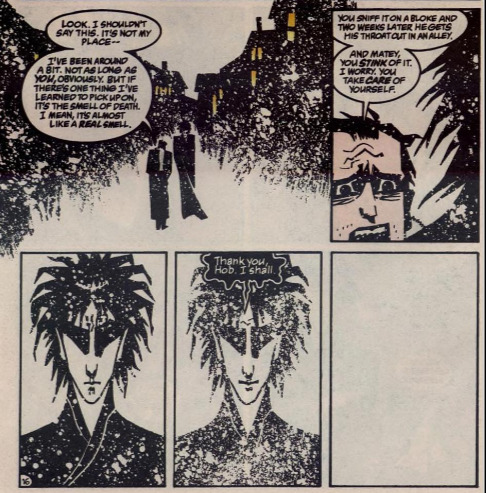
“You take care of yourself.”
What if Dream went to Hob, knowing his friend, being perceptive, would guess that something was up?
What if he just wanted to be reminded that someone cared whether or not something happened to him?
He gave Hob a promise that he would take care of himself. And so he did, in the face of overwhelming odds. (Odds that he may or may not have set in motion himself, true, but that just makes it more extraordinary.) Until he couldn’t any more. Until taking care of the Dreaming took precedence over taking care of the aspect, Morpheus.
Because Dream of the Endless always keeps his word.
334 notes
·
View notes
Text
The nature of Aziraphale & Crowley’s relationship (Good Omens)
So I know I have like 30 followers and probably no one gives a shit what I think, but the internet’s the internet and it’s free to post on Tumblr so who cares
I have gone back & forth a bunch on what I think of the “discourse” (if we can even call it that?) surrounding Aziraphale and Crowley’s relationship in Good Omens, and I think I’ve settled on something.

I am still very much for the “why does this criticism only seem to come up when the pairing in question is of the same sex (or played by actors of the same sex)” argument against the whole “why can’t they just be friends” criticism that comes up in response to a lot of queer media, however, I can see why it doesn’t necessarily apply here. At least not in the same way.
In the book, and subsequently in season 1, their relationship is entirely up to interpretation. The information we are given at that point about their past can absolutely either be seen as platonic OR the grounds for something more. I don’t think it’s wrong to say you think it’s one way or another. With the way that their relationship works at this point in the story, they have a lovely friendship and if that’s the point where the progression of their relationship ends, that’s all well & good.
However
Moving on to season 2, we get a little more. There are people saying that the romantic element that has been added kind of ruined it, and I would like to respectfully disagree with that. First of all, the surviving author of the original novel is directly involved with the writing, so I have to say I find it kind of hard to say that anything has been ruined when it’s still directly from the mind of one of the people who wrote it. He is writing it with what the two of them had planned originally in mind. (I believe he said at some point that season 2 is a sort of stepping-stone between the original book and the sequel that he and Terry had in mind)
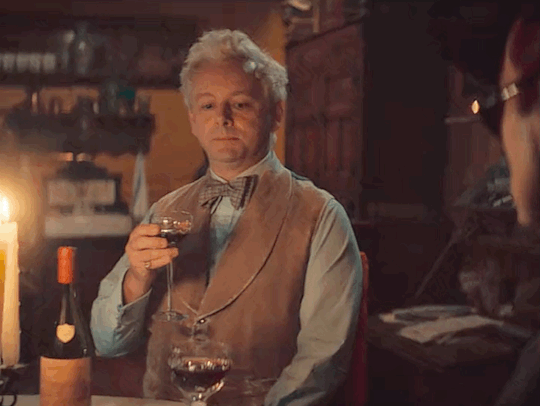
Second of all, the romance didn’t exactly come out of left-field. As I said earlier, you can interpret their relationship in season 1 however you like, but the notion that their relationship may actually be more than just a friendship is an interpretation that was clearly explored in the second season. Neil Gaiman is not one to shy away from queer storytelling, so if that is the direction he wants to take it, that’s where it’s gonna go. It’s 2023, LGBTQ+ representation in media is far less taboo than it used to be, and so he has virtually no reason to filter their relationship into something that he doesn’t actually want it to be as the writer.
If you want my personal opinion, I think that season 2 being “quiet, gentle, and romantic” is foreshadowing for their relationship’s progression season 3, so I can definitely see the romantic undertones that have more or less been there the whole time (of course depending on how you interpret it) being brought out into the limelight. (I know he said that season 3 will most definitely not be those 3 things, but that’s not to say that none of those elements will be showing up at all)
All in all I don’t think it’s wrong or “homophobic” to interpret their relationship however you see it, but in terms of my own theories, I think that if the fact that the (once again quiet, gentle, and romantic) season 2 is a “stepping-stone” between seasons 1 and 3 is true, their friendship is evolving into something more.
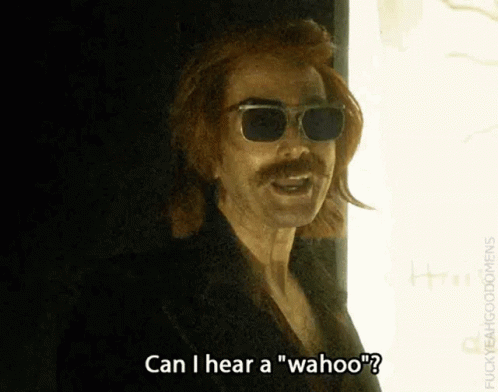
#good omens#aziraphale#crowley#good omens fandom#david tennant#michael sheen#neil gaiman#terry pratchett#good omens meta#good omens meta post#good omens theories#lgbtq media
81 notes
·
View notes
Text
Case study and analysis of the 1992 Good Omens movie screenplay (“the shitscript”) in light of the ongoing WGA strike
As one could suspect, the topic of the 1992 Good Omens movie screenplay and its infamy has recently emerged from the depths of the fandom. In light of the ongoing WGA strike it’d be good to properly address this issue, starting with Neil Gaiman’s own recollection written in 2004:
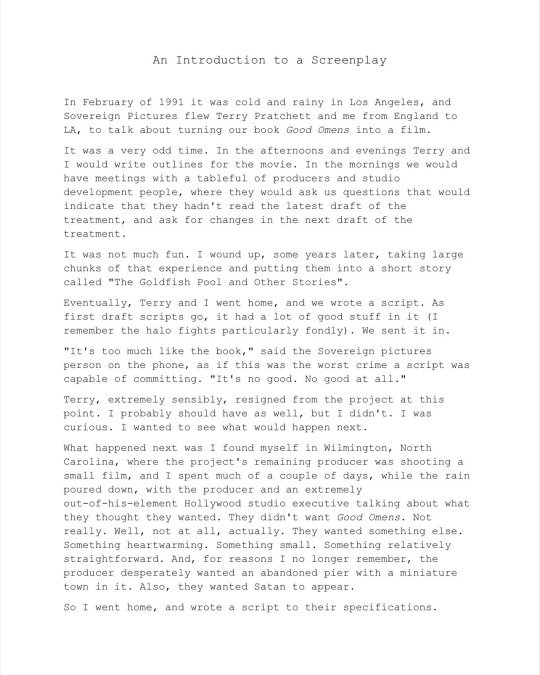
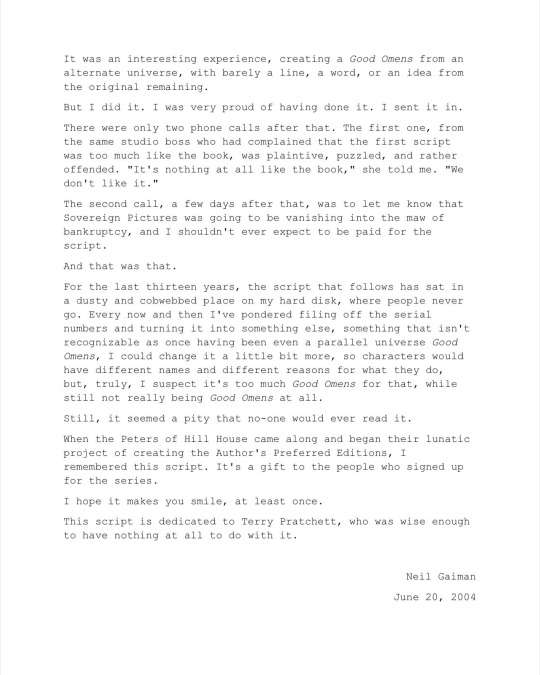
It’s basically the same old story — of brilliant creative workers struggling under the pressure of detached studio executives and being legally forced to mutilate their work again and again for no artistic or economic reason — we’ve heard before in many different contexts.
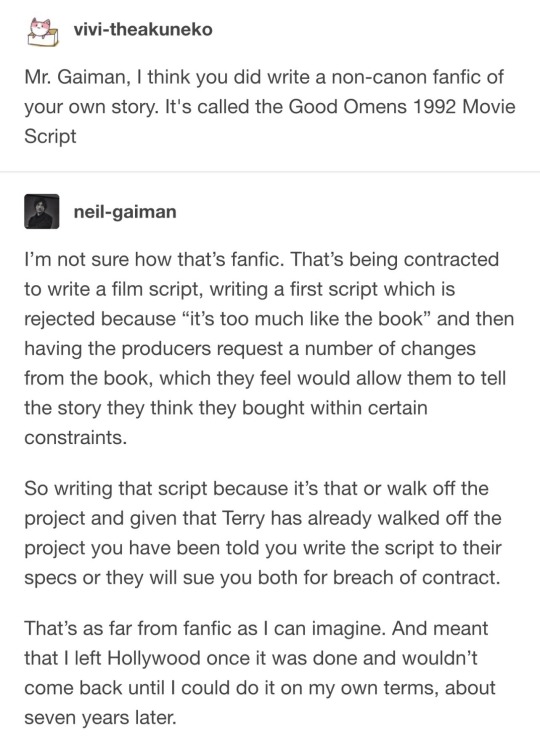
If you’re reading this and somehow still wondering why writers are fighting for their rights at the moment, their job security hasn’t changed much since then. Please follow the WGA, SAG-AFTRA, and other unions’ official channels for detailed information and ways to help the cause.
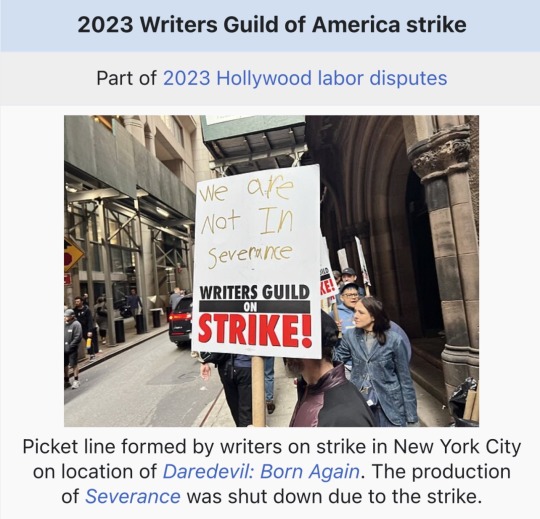
Anyway, it took over a decade and an enormous effort to print the screenplay in a limited edition of 552 copies. It can’t be distributed otherwise due to IP law, but some fans shared its fragments online and heavily criticized them, dubbing the 1992 source material #shitscript
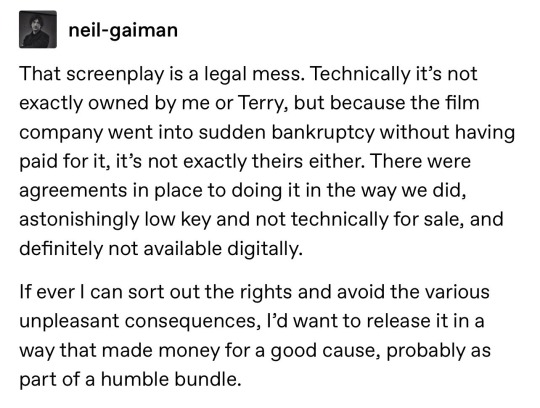
There’s been obviously a lot of controversies over the changes in the plot and the relationship between the main characters. And rightfully so — the number of iterations has created something very different from the beloved book and the award-winning show we can all enjoy today.
It’s… objectively not good. Wouldn’t be considered a hit back then and certainly not by today’s standards. I don’t think I would watch it in any other way than through channel surfing. However, it’s not a monstrosity some people believe it to be and not a case of low effort.
Let’s start with the world building: the setting wasn’t changed to the US. It’s still very much based in the UK, mostly London and Tadfield, although the latter lies now by the sea and seems much more ominous. Interestingly, the British Museum becomes a prominent location as well.
The main character and the designated hero is not surprisingly Crowley, this time in his 90s anti-hero glory. If you haven’t watched many movies of this era, esp. dark fantasy, this trope involves middle-age disenchantment, cynicism, as well as hefty doses of sarcasm and brooding.
90s anti-heroes are a dark, grim, and unnecessarily violent embodiment of power fantasy, matching the destructive ideology of that time. Combined with uber-masculinity and performative strength over weaker characters, nowadays they naturally evoke more cringe or worry than awe.
1992 iteration of Crowley is basically in his Furfur era. Deeply unhappy and stuck in a dead end job, all he talks about is how he hates Earth and his assignment here, considering a transfer to Alpha Centauri as his one and only possibility of career advancement. Or life, really.
The talking part is important here, because he clearly compensates by insulting everything and everyone. He hates on the whole planet at length only to confess that he’d rather stay here with Aziraphale due to “no good restaurants”, “no decent bottle of wine” in Alpha Centauri.
Yes, he’s verbally abusive in his automatic response to stress. But doesn’t hate Aziraphale. In one particular scene he calls Azi stupid twice only to assure him that they are friends and to offer to solve the problem when he sees that his words were taken seriously and hurt him.
Crowley refers to him as “my angel” and “my dear Aziraphale”, agrees to Aziraphale’s suggestion of sharing a room, praises the angel as a “miracle worker around the home”, drinks the tea he makes for him, and generally proves to be much softer towards him than he wants to admit.
Aziraphale, on the contrary, wears his heart on his sleeve. He’s the one engineering ways to spend more time together, following Crowley around, checking up on him (including miracling himself into his apartment and office when no one answers the door), offering help right away.
He’s successfully calming Crowley down through his anxiety attacks, overcomes his dislike of heights (!) for Crowley, directly challenges him and even breaks rules only to make Crowley stay with him. Crowley seems to be his main motivation in this movie, not the saving the world.
1992 Aziraphale also has the most badass scene in the whole Good Omens multiverse to date, taking a 180 degree turn from the typical guardian angel we all know and love to the real angel of wrath protecting Crowley from harm in his true form.
But there’s no Their Side in this universe. The only semblance of that concept appears in the context of Anathema not representing either of their respective bosses, but humanity. “That’s the trouble with the humans. They’re on their own side.”
This Crowley appears not as much on Hell’s side as under Satan’s heel. He’s scared of him and subservient, and needs Aziraphale to prevent his escape as a pretext to do what is right. He lets the angel stop him by pretending that he doesn’t even see him cheating during their duel.
By finally standing up to his toxic boss (Satan is like Gabriel during the body-swapped trial, suave and cruel) and leaving Hell’s side to do good, Crowley takes an emancipated and employee-focused stance instead of fighting for his relationship with Aziraphale like shown in S1.
Which is a shame, but matches the overall tone of the screenplay and the times it was written in. The concept of free will, while simplified in a true Hollywood-style to issues like mind control and fear, is still crucial to this interpretation of the Good Omens original plot.
Especially the character of Anathema is seen fighting both of these things. There’s no Agnes Nutter with her prophecies here, only a 21-year-old witch and her will to thwart the ultimate evil versus her fear of doing it at a cost of one boy’s life, versus Satan’s brainwashing.
Madame Tracy appears slightly redesigned as a new character as well, but isn’t 𝘲𝘶𝘪𝘵𝘦 𝘵𝘩𝘦𝘳𝘦 for the most part. She’s been enjoying her youth way too much to see how fast it was fleeting, and this sudden realization left her in shock from which she denies to come back.
Unfortunately she’s also the one who took in baby Adam and now stays under his care. The level of his parentification is unnerving, much like his bullying and loneliness. He struggles to be loved and ask for love, which becomes his main quest beyond, y’know, the apocalypse thing.
Don’t worry, despite everything all ends well just like in the book. The family of two gets a chance to start again on much healthier terms and Anathema to live for herself for the first time in years. Our heroes get back in their car, Crowley tempting Aziraphale with an apple.
All in all, this whole post is a very long reminder for Amazon Prime to #PayYourWriters, #PayYourActors, and #RenewGoodOmens! The strike is still ongoing and crucial for any new content for this and many other fandoms #GiveMeS3orGiveMeDeath

97 notes
·
View notes
Note
WHAT DO YOU MEAN DREAM'S HAIR USED TO BE WHITE!! oh my god. i just saw your post about killala and i have now perished. thanks for breaking my heart.
but also hi!! i'm relatively new to the fandom and it's a great place to be. i haven't finished reading all the comics yet but i'm curious to know:
what do you think are the main differences between TV!Dream and Comics!Dream? i've heard so many people claiming that he is incapable of changing, for instance, and though the show does convey his overall rigidity pretty well, i'm not getting the vibe that he's immutable.
also!! it's clear that he feels a lot. which is always funny to me when the corinthian is like yo, try this and maybe you'll feel something for a change but like. he does!!! or i get the impression that he does. he probably feels too much if anything?? all of it simmering just beneath the surface, barely contained. how would you personally analyze his relationship with his own emotions?
i hope all of this is coherent enough for you to answer lmao, i saw your post about enjoying being asked sandman questions two seconds after i woke up and barged into your inbox. hope you have a lovely day!
Thanks so much for the ask, and welcome if you’re new(ish) to the fandom! 🤗
I’m sorry I broke your heart—much more heartbreak to come I fear if you haven’t read the comics yet, so I’ll try to keep this as spoiler-free as possible.
I am one of those people who believes the differences between comics!Dream and show!Dream are actually not as big as they are made out to be where it matters, and you will definitely find people who disagree. At the end of the day, we all read it through our own lens and will never be fully objective about it.
The main difference I see is that they filed off the rough edges of the comics a bit to make a new audience sympathise more. It’s very hard to do that with a character who is basically in full arsehole mode for most of the first 40 issues or so, and even then only slowly begins to come out of it (although we can obviously see glimmers of what lies below the surface at the beginning of the comics, too, but it’s far more subtle than in the show). I’ve worked in musical theatre for a over decade of my life and understand a bit about bringing the written word to stage/screen, and some things simply don’t translate well from book to stage/screen, and you have to change it. So my personal opinion is we get a more sympathetic Morpheus and certain changes so the audience can do exactly that—sympathise off the bat. You will lose an audience pretty quickly if they don’t care about the protagonist and the universe he moves in, and you can’t be as nuanced about it as you can be in a written work. We’re talking about streaming services thinking about profits here, even if people don’t want to hear it.
Also: The more you sympathise with a character, the deeper the emotional investment and the more you feel, even if it hurts.
Having said this, I don’t think Morpheus is incapable of change, and I never got where that idea comes from. His biggest flaw is that he believes he cannot change (and even he has moments when he admits he might have). In the introduction to Endless Nights, Neil Gaiman says that he was once asked to describe The Sandman in twenty-five words or less, and famously, it was this (you might have heard it):
“The Lord of Dreams learns that one must change or die, and makes his decision.”
And I think some people might have wrongly taken that for an either/or thing. I don’t want to say too much at this point because I don’t know how much you know (if you’d like spoilers or already know how it ends, let me know, I’ll happily expand on it). Only so much:
He is capable of change, also in the comics. Very obviously so. But just like he denies he has his own story (which also isn’t true), he denies he can change. Or at least he thinks he perhaps cannot change enough (it’s actually hard to write about this without giving everything away, help! 🙈).
As for his feelings: He does feel, but again, it is something he pushes down and will deny himself. Until it bursts to the surface and breaks through, and when that happens, it’s usually with, well, let’s say varying results, and that’s putting it mildly. Personally, I’d say he has problems relating to his feelings, but that doesn’t mean he doesn’t feel. Quite the opposite in my view. He holds the collective unconscious—all unprocessed feelings and whatever else floats around in that collective mess, and it’s exactly what he says to the Corinthian in that famous scene: he needs to keep a lid on it and keep that lid firmly closed so all of it doesn’t consume him. But that also means denying himself the feelings that are linked to his own personhood (if you want to call it that). There’s Dream of the Endless, and then there’s Morpheus. And while they’re one and the same and inseparable, Morpheus is also the “point of view”. The character, the person, if you will. And deep down, he craves that personhood so badly. Out of all the Endless, he is the only one who basically collects names because they mean having something beyond his function, which is also mirrored in what he tells Death in “The Sound of her Wings”: he wants something more. He is the only one whose realm is populated with sentient beings (yes, I know Despair has rats, but I think you get my drift). He is desperately lonely and struggles with it. He seeks connection yet denies it to himself. That’s not someone who doesn’t feel.
I don’t know if this answers your questions at all—I was doing the wild “spoiler-free” dance 🤣 But please let me know if you want me to go a bit deeper, I love talking about this stuff.
You can also have a look at my metas if you haven’t already. The headers pretty much explain what they’re about and what spoiler-level to expect, but none of them are truly spoiler-free I guess:
Again, thanks so much for encroaching on my inbox, and feel free to follow up if anything was left unanswered.
@dreamaturgy ask answered
#the sandman#sandman#dream of the endless#morpheus#sandman meta#ask answered#send asks#sandman analysis#sandman character analysis#sandman comics#the sandman netflix
31 notes
·
View notes
Text
Random movie ideas:
1) A comedy-historical movie about the Great Emu War, starring Chris Hemsworth, Jai Courtney, and Ben Mendelsohn as the soldiers ordered to kill the emus.
2) A legal drama based on the real-life lawsuit between Todd McFarlane and Neil Gaiman over the character rights of Spawn (think “The Social Network”). For casting, I was thinking John Krasinski as McFarlane and Andrew Garfield as Gaiman.
3) A horror movie about a submarine crew that goes down to Challenger Deep to study the area and end up discovering the remnants of an underwater city. The researchers managed to gain entry into the city, not knowing they’re walking into a nightmarish situation. For a potential cast, I was thinking Idris Elba, Kate Siegel, and Steven Yeun as the 3 leads.
4) A coming-of-age movie about a teenager (played by Amybeth McNulty) who runs away from home and makes her way to California since her favorite band is looking for a drummer. She fails the audition, but is taken in by the band’s manager (played by Keanu Reeves) when she says that she doesn’t want to go back to her family.
5) A comedy-historical movie about the Lobster War, with the main focus being on the Brazilian and French governments debating whether lobsters are fish or not. Aubrey Plaza plays the protagonist who is a journalist who can’t believe this conflict is an actual thing. By the way, here’s a meme to summarize this potential movie:
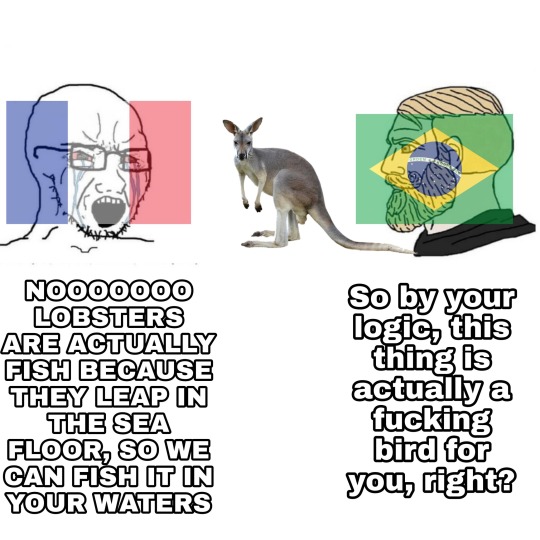
#movie idea#film idea#emu war#chris hemsworth#jai courtney#ben mendelsohn#todd mcfarlane#neil gaiman#spawn#john krasinski#andrew garfield#challenger deep#idris elba#kate siegel#steven yeun#amybeth mcnulty#keanu reeves#coming of age#lobster war#aubrey plaza
130 notes
·
View notes
Text
How did I miss this??? (Part 2)
Now previously I said that I think these two have been together (and I mean TOGETHER together) for a very long time.

I have had some more thoughts/theories...they just keep coming and to be honest I'm not even sure where to start but I'll give it a go.
I do not expect anyone to read this but in all honesty, I just need to get it out. This has been going round in my head for a few days whilst I attempt to form it into a path of logical reasoning. I think I am there and there are holes but hopefully you lot can help me fill them in. So, get comfy, we might be here a while…
Assuming the meeting in Rome was a date...they have been doing this for a long time. Now at first they were extremely careful but over the centuries they became a little more brazen with being seen in public together, knowing what they could get away with. Again, nothing too obvious.
Now, many have been talking about the bookshop as a metaphor for Aziraphale and Crowley's relationship, but I think it's more than that. I shall explain:
Before I get into it, a few pieces of information that are relatively common knowledge and/or I have come across in my daily browsing (I can’t find where I saw all of them, so anyone please help):
Neil Gaiman has said that the scenes we see between Aziraphale and Crowley aren’t all the times they’ve met. This is just the meetings we see – which is understandable considering they’ve been on the planet for 6000 years.
Zira and Crowley evidently have some form of connection or awareness to their respective head offices. Even going so far as to know when they are being watched (S1, EP 6) just before they swap back.
We can all agree that there is almost nothing that is not there for a reason; details, easter eggs, acting choices, props, set etc.
We also know that the story is pretty much plotted out so it stands to reason that there will be a few story threads that go through all episodes, however subtly.
OK. So.
Aziraphale bought the bookshop in the 1700s, up until then where did they hang out? I'm thinking they were using the various 'rendezvous points' anyway regardless, we know Crowley has a flat but we also know that hell has a sort of direct line to it.
Anywhere is very open and somewhere they can be watched. Celestials have materialized inside the car, on the street, in the flat, even on the TV. The only place they never seem to materialize? The bookshop. Even Metatron came in through the front door (when he isn't a floating head summoned through a portal). note it has no TV and no radio if I remember. The only time any demons have materialised is at the end when Gabriel got his memories back. I believe that's because the demons were "invited" in earlier on.
Here's my point. The bookshop is their safe place, it's THEIR space. Remember we don't see everything, we haven't seen everything. Every time we see them, they are in a public place, with someone watching or in the bookshop...with the curtains open. And remember, they KNOW when they're being watched.
Allow me to draw your attention to Season 2, Episode 1. Crowley is already on the way to the bookshop when Zira calls him, and when they meet in the coffee shop he is rather confused as to why they aren't in the bookshop. (Then of course we have the whole naked man friend fiasco and Crowley's reaction to that...)
When they do go to the bookshop I noticed Crowley DOES NOT EVEN QUESTION WHY ZIRA IS CLOSING THE BLINDS. He has no idea Gabriel is there, (he just knows something about a naked man, which is another conversation). Now this suggests to me that this is something that is done often.
They go into the bookshop and have their 'us time'.
This also helps this make sense:
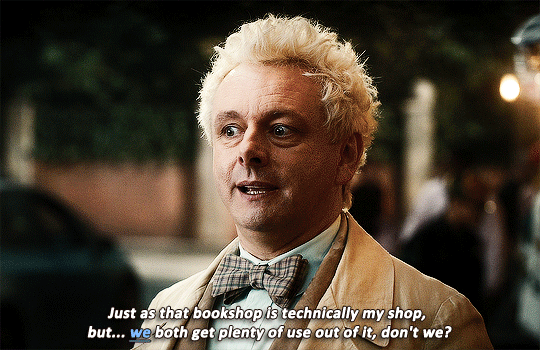
All lovers meetings would be in the bookshop. That was their space. Alone. Where no one was watching.
Now you may be thinking “We’ve seen them alone in the bookshop before when no one was watching and they weren’t behaving like a couple.” But someone was watching. WE were watching. And as we’ve established g-d only shows us what she wants us to see. She is telling the story.
I also think they have gotten so good at pretending in public that they have developed a code of sorts. For example, I think 'Breakfast/dinner at the Ritz' means something totally different.
They care for each other so deeply that they cannot stand putting each other in harms way.
They are celestial beings so their idea of love and relationships is something that is totally different and beyond the understanding of humans.
They saw Beelzebub and Gabriel be together openly in front of everyone and Zira grabbed Crowley’s arm. To me that is a very ‘familiar’ gesture. It’s saying ‘Look, they’re doing it. We can do that too.’ He then proceeds to look at Crowley with such loving adoration as if he cannot see any reason that they can’t be together openly and honestly.
Aziraphale then goes to coffee with Metatron whilst Crowley waits in the bookshop and tidies up. There is something strange about this. Throughout the time he is taking care of the bookshop whilst Zira is in Scotland, we see him chucking books all over the place. Even at the end we see him chuck a tray of food on the chair. So why is he tidying up now? – he tidies up because they are going to USE it.
He says, they are going to an ‘Extremely alcoholic breakfast at the Ritz.’ So if they are not going to be at the bookshop, why would it matter if Muriel is there or if it’s tidy? They do need US time. It’s a euphemism, it’s code. “Breakfast at the Ritz”, “I’ll give you a lift”, “Waiting inside”.
This is why it shocks Crowley so much when Nina thinks they’re a couple. They think they have been hiding it so well for a VERY long time and he can’t believe that someone has thought that for real. Yes we have all done it and been on the receiving end when someone thinks you’re a couple and you aren’t, it happens. But Nina just flat out refuses to believe that they’re not.
That is when Crowley goes to the winebar. Zira asks him why he isn’t ‘waiting inside’ “You like waiting inside.” As in “We never have a date in public, they can see us.” Then Crowley explains it’s because Jim is in the bookshop but in reality it’s probably partly because he’s realised that they haven’t hidden it as well as they thought they did, so they may as well sit there.
That reaction when Shax says to Zira, that hes not Crowley’s type? Seriously, that is a very much a “That’s what you think.” look.
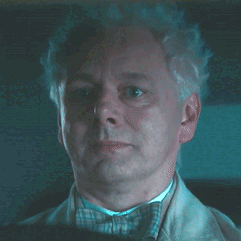
We are a group of the two of us and we’ve spent our existence pretending that we aren’t. – They really were pretending. He wasn’t talking about being in denial about their feelings for one another, he was literally saying they were PRETENDING not to be together. Now he wants everyone to know. He doesn't want to pretend anymore.
He thought Zira felt the same way until he told him about the whole 'going back to heaven' situation. Not sure how it would have gone if Crowley spoke first.
Aziraphale did not seem shocked by Crowley's confession. He already knows. What he doesn't understand is why he doesn't want to go to heaven.
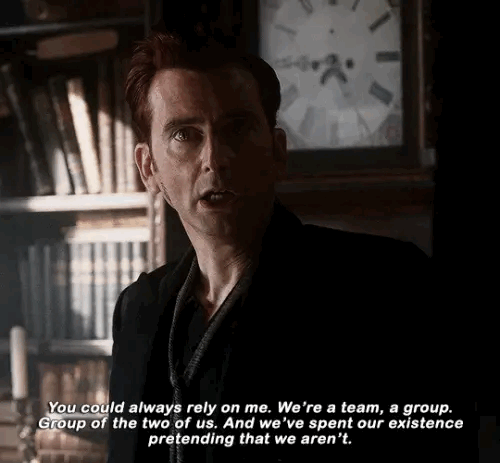
Zira still believes in the fundamental goodness of heaven because he has nothing to compare it to. Crowley has been on both sides and knows they are both as bad as each other “Life on earth would be just as dead, if heaven ended it.” That’s is why Crowley wants so stay on earth or go away with Zira.
Zira wants to go with Crowley to heaven because as others have pointed out, that’s where he believes they will have the best life and be able to be together. Crowley knows different, he was cast out into a pool of boiling sulphur just for asking questions. So he walks away and says ‘good luck’. Zira has not had the same experience of heaven Crowley has, Crowley has experienced the worst of the universe on both sides and can’t live like that anymore.
So "You can't leave this bookshop" yes, indeed, as we have established means "Don't leave US."
We could have been ‘US’. But Aziraphale won’t see it. So Crowley does the only thing he can think of and kiss the love of his entire existence. Whilst they are being watched. That is why Aziraphale says ‘I forgive you’. It isn’t just an ‘I love you’ it’s an ‘I forgive you for telling them our secret.’ I forgive you for trying to change my mind.
More in Part 3...
#angel crowley#crowly x aziraphale#good omens#good omens spoliers#ineffable spouses#crowley#good ineffable omens#aziraphale#good omens analysis#good omens season 2#aziracrow#aziracrow fanart
91 notes
·
View notes
Text
You’re just an Angel who goes along with Heaven as far as he can
I keep thinking of this comment, from the Job minisode, in terms of our participation in a capitalist society, where our job is to make money — where making things and distributing them and serving people are just a mechanism for accomplishing the real purpose: generating money.
And individually we can’t overthrow capitalism, but as long as we understand the make-money mandate, we can use its structure to create beautiful things that help people. (Neil Gaiman can, for example, convince Amazon to produce a show like Good Omens.)
In a similar way, in the Good Omens universe the goal is not to do Good. It’s to execute God’s will, to manifest the ineffable plan. Angels “doing good” and demons “doing bad” are just … jobs. That’s just the structure God set up to accomplish their real objective.
Whatever that might be.
I’m not sure I completely believe my own theory here; but one could argue that in the Job minisode, Aziraphale should have been sent to Hell for defying God, but God gave him a pass because … God still won. Aziraphale’s lies, when combined with Crowley’s own defiance of orders, ensured God won the bet — ie the corporation made its money…
But to wrap it back around to my original point: it’s not God or Satan who punish Aziraphale and Crowley for breaking the rules, but the two bureaucracies. By infiltrating that bureaucracy, Aziraphale just might change things.
It’s a big freaking risk, though. I wouldn’t have done it. I’d have gone to Alpha Centuri with Crowley.
21 notes
·
View notes
Text
Working Class Gods
So I am fully aware that this will be so soaked through with bias and based on personal anecdotal “evidence” that it will start dripping down and staining the carpet. If you choose to engage with this, please remember that these are opinions, UPG, and completely pulled from my ass.
This isn’t meant to be a “hot take”, merely an observation. I think the Gods (of any pagan belief but I’m talking about the Hellenic deities here) are more connected to and more present in the lives of working class and “middle class” people and have always been that way. Let me explain.
This may just be my bias as someone who has only ever known a working class life, who doesn’t get caught up in the intensity of ritual and research, and has read American Gods about twenty times at this point, but I think the Gods as I know and see them are and always have been of the working classes of society. However you want to define that. I believe the Gods have a deeper and more organic relationship with pagans who identify and live lives at those sort of levels. I am not saying that those who would be considered “upper class” or those who could be categorized as “the 1%” in any given society can’t experience and connect with the Gods. I cant and won’t ever say that. Just the more it turns in my head and stews, the more I believe what I’ve said.
The Gods are everywhere. They can be found literally anywhere if you look for them. They aren’t limited to the things humans create or the ways we’ve categorized ourselves and them. Aphrodite can just as easily be worshipped by a millionaire Instagram influencer as a teenager who works at Sephora as a job to help her parents pay the rent. Athena can be found walking the aisles of Harvard or Oxford just as much as being among the shelves of a small town bookmobile that is the closest that town has to a library for 100 miles. Dionysus can be found at the biggest and more glamorous galas and events just as well as being able to sit on the couch with a gay teen in Alabama who isn’t out to anyone but their best friend. Apollo can be on the stages of a sold out stadium show just as much as being in the furthest, cheapest back row seat. I could give examples for every Olympian and Titan with a name, but I’ll just leave it there.
The stories we have are known to have originated as oral traditions. Oral stories told to people until someone wrote them down, and even then they still were told as bedtime stories or around a campfire. It was the populous, the working class, that told those stories most of the time. Sure, an emperor or a queen might tell their children stories sometimes, but a majority of what we have came from the continuous belief and propagation of stories by the farmers, smiths, fishermen and artists. And I think that’s the same as now. Anyone can become enthralled with the stories and mythologies retold, some across a book of retelling in any library. But I think it’s the kids who aren’t in the upper echelons of private school and trust funds are more prone to that discovery and for that to stick with them in a meaningful way.
I’m lucky that my gods aren’t used by people in positions of power to control society. I’m lucky that my religion isn’t the dominant one and my gods names are being taken in vain to control others. I can’t speak for how the world was in the past when that WAS more likely the case, but for today I can say that I’m glad it isn’t.
One thing that has always stuck with me about my favorite book, American Gods by Neil Gaiman is how the old gods are on the level of working class people. It has stuck with me into my own fiction writing as well as my beliefs. I do believe that if the Gods were to take physical form and function in today’s society (maybe they do, who knows. I’ve met people I could easily believe were Hephaestus or Hermes), they would take on a working class life and working blue collar jobs. I wouldn’t expect to see any of them taking high positions of power, being politicians or royalty. I would expect to run into them at the DMV, in line at the grocery store, or behind a cash register. I’d expect to see Apollo running a small Etsy shop, Hephaestus to work at a factory, Hermes to run a gas station or auto repair shop, Zeus to be a pilot, Poseidon to be a lifeguard or work at a community pool.
I see the gods in the everyday. I see them in all the things of my life and connect with them in everything I do, not just when I’m at my altar. Seeing the spectacular in the mundane or the ordinary was how I was raised and how I still work today. The Gods are there in chipped nail polish, calm Sunday mornings, road trips in a cheap car, and in the lyrics of my favorite songs. I started thinking about this more as I was curating a small playlist on Spotify for what I call “My Hymns”. They are regular songs that I associate with the Gods. Some have some spiritual meaning intended for a different deity, and some are just match the ✨vibes✨of the Gods. I listen to that playlist as a devotional act, letting each song remind me of its own god or goddess, letting my singing along or quiet listening be like a hymn being belted out to the rafters of my own private temple. It just gets me thinking about my Gods and it makes me happy.
I hope this all makes sense and I didn’t mince my words too much.
Cheers
-D
#personal#blog#hellenism#hellenic polytheist#hellenic polytheism#thoughts#Post#paganism#blue collar#upg#gods#goddesses#theoi#deities#essay#rant#hellenic gods#working class
82 notes
·
View notes
Text
Let’s Talk Names Pt.1
I had the sudden urge to research the angels and demons that appear in Good Omens. This has nothing to do with the fact that I’m meant to be focusing on Grad School. Leave me alone. This will be long, but some of the stuff I found was pretty cool. Quick disclaimer: I am neither a good scholar nor a good researcher. I found most of this on Wikipedia.
Angels first because, honestly, they were a lot easier. Most of them will have names ending in “el” because etymologicaly, “el” means God. Most of their names have something to do with her.
Michael, for example, means “who is like God?” This is meant to be a rhetorical question as the implied answer is no one. HOWEVER, in Latin it can also be the opposite. Meaning “one who IS like God.” Kind of explains a bit about Michael’s personality, tbh.
Uriel means “God is my flame,” and is described as a smart and scholarly angel.
Sandolphon from s1 was pretty funny as his name can be literally translated into “co-worker.” I thought this was a funny nod to his role in s1, which mostly consisted of following Gabriel around and generally being a freak. BUT! Then I read further. His name is thought to deal with the Book of Revelation. The book in the Bible that deals with… The Second Coming! According to Wikipedia, his name probably refers to his relationship with the Metatron. Not Gabriel. Makes you wonder if he’ll make an appearance in season three…
Speaking of Gabriel, I decided to do this both for his given name and for Jim in case there was anything to that. Surprisingly, there was. Gabriel means “God is my Man,” or perhaps “Man of God.” Straightforward enough. Jim is where it gets a bit more interesting. Jim (short for James, short for Gabriel) can mean a few things, the first perhaps being a bit more well known. James means supplanter. Supplanter meaning to overthrow. Fitting for the Prince of Heaven willing to throw it all away for his love for the Prince of Hell. James can also mean protector (an Angel giving himself up to demons clad in a sparkly white robe comes to mind). The last meaning is “may God protect.”
Saraquel was hard to find. There seems to be a few different names for this Angel, but they all mean “God is my ruler.”
Aziraphale was a name made up by (I believe) Sir. Terry. From what Neil Gaiman has said, I think they came up with something that sounded angelic enough to be an Angel’s name. Intentional or not, however, there are still a few things that can be discussed. There was nothing on Wiki, but after consulting multiple naming websites, Azira can mean “pioneering spirit,” (aka a leader) or “rising star.” Either one fits with his upcoming arc. Rising star hits a little harder, though…. Perhaps more importantly, however. His name does not end in “el.” It ends in “le.” Close to angelic, but not quite. Very fitting for our grey shaded angel.
Time for the elephant in the room: Let’s talk Metatron (I didn’t forget Muriel. We’re saving the best for last). The etymology of the Metatron’s name is highly debated. One theory is that Metatron comes from a Greek word meaning “co-occupant of the throne.” …What?! The throne here is obviously referring to heaven, but this calls into question WHY HE IS CO-OCCUPYING?! Another theory is that Metatron comes from a Latin word meaning “forerunner.” Forerunner means (wait for it) “one who announces the coming of another.” Um… HELLO?! It’s fine I’m fine. Either of these are obviously VERY fitting and I can’t wait to see what Neil has in store for us.
Last but not least. Muriel. I’m warning you now, there isn’t much here. What is here is a FUCKING ROLLER COASTER! Boring part first, Muriel comes from myrrh. Yes, the myrrh that was gifted by the wise men to Baby Jesus. Now I’m going to tell you EXACTLY what else it says about them.
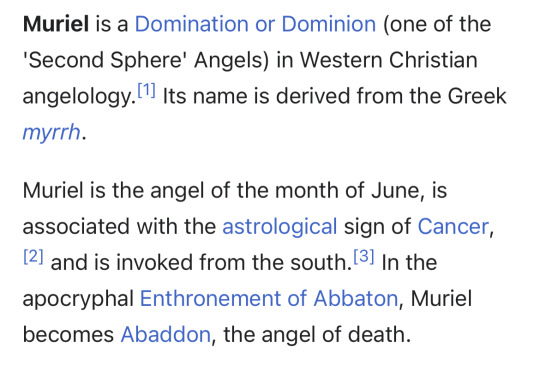
First of all, Muriel is a Dominion. They tell Crowley that they cannot access Gabriel’s trial because “you have to be a throne, a DOMINION, or above.” Now, is it possible that Neil picked an Angel at random to fill in this position? Yes. But considering he kept the positions of the other Angels, why would Muriel’s be changed? Second, and perhaps the scariest, Muriel, in biblical lore, becomes the ANGEL OF DEATH. I… Neil. Neil if you hurt them…. Also, perhaps Muriel is promoted to Dominion when they BECOME the Angel of Death?
Anyway, it’s 1 am now. I’ll do part 2 tomorrow. I’m new to long posts on mobile, so I hope I did this right.
#good omens#good omens season 2#ineffable fandom#aziraphale#good omens spoilers#ineffable husbands#good omens s2#angels#metatron#metatrash#Michael#uriel good omens#gabriel#Jim#muriel#neil gaimen#neil gaiman good omens#this took me hours#i’m so tired
37 notes
·
View notes
Text
Now that is morning, here’s the episode 6 rant I promised. (go2 spoilers ahead!!)
I woke up this morning to a dozen posts on my dash complaining about Aziraphale and his behavior in the last episode. Many were just screaming, as I can understand, but many were complaints about how out of character his decision was. I’m here to disagree, and please bear with me on this.
In the previous season, Aziraphale is constantly seen to be the one resisting ‘their own side’. He doesn’t run away - though perhaps this is more out of love for humanity than it is for g*d - he puts up resistance in making the agreement, and he worries a lot about whether he’s doing good or not (garden of Eden for example).
Beyond resisting to carving out a place for himself, he also maintains faith throughout the series that Heaven will pull through and do the right thing. While thwarting Armageddon, he constantly reports back to heaven expecting a pat on the head. It genuinely surprises him when Gabriel and the other angels say they want the end of the world to come. Even after their initial refusal to change plans, he still tries and tries and tries. When all else fails, he go to the Metatron trusting that g*d must be in agreeance that wiping out humans is not the right thing. It is only then, after so many denials and attempts to fix things that Aziraphale finally takes matters into his own hands. Though, it’s important to note he didn’t make this decision for Crowley, but rather for humanity and his care for them (this is apart of his decision in 2x6 I believe so keep this thought in mind). It’s clear he has a lot of conflict around g*d v.s. what’s right, and he wants to think that heaven will eventually come to play into both.
Now into season 2. Right off the bat we’re faced with the conflict of staying loyal to heaven or not. The moment Aziraphale notices Crowley is leaning even the slightest bit towards disagreeing with g*d, he appears incredibly uncomfortable and abandons his efforts of trying to befriend Crowley, doing his best to actually evade the situation. From the very start of the season, it’s clear who’s on who’s side with Crowley obviously not caring about sides (as always) and only about the circumstances while Aziraphale’s chooses not to question the ineffable plan.
When the scene is transported back to the present day, our first view of Aziraphale is him helping out Maggie and doing other such good deeds. Crowley makes a comment in the first episode that he’s still performing angelic miracles and helping out humanity. This isn’t a huge detail, but I think it’s interesting to see him still believing in doing the ‘good’ thing.
Now here’s the part that makes the ending really fit with the rest of the season: the minisodes. Neil Gaiman had mentioned in an answer to asks that the minisodes would all pay out and tie into the ending (I can’t find it but I remember seeing it). I had thought this meant they’d be clues to how Gabriel lost his memories and such, so I spent each minisode/flashback on high alert. Yet, I couldn’t find anything that really made them tie together, beyond similar places being meeting sights for Gabriel and Beelzebub.
I was looking for the wrong thing. I should have been paying attention to Aziraphale. Very quickly into the second/third episode I knew there was a trend between Aziraphale’s conflicting morals and the flashbacks. My father who’d been watching with me also picked up on this. He seemed to be obsessed with doing the right thing and struggled with going against g*d’s will. By the end of each event though, he would decide to do what he thought was good even if it was against g*d’s plan.
For example, in the minisode with Jobe (spelling?) he starts off believing that he shouldn’t let the poor man have his life ruined. He triple checks the permits, he argues with the other angles, he tries to come up with reasons why g*d would do this to her favourite human. He looks for loopholes, he finds none. Eventually he thwarts it, going against the will of g*d and her angels for the sake of his own morals. He did what he thought was ‘good’. This is also the time where he decides to become a little like Crowley in his relation to his head office. He is an angel who will go as far as he can with heaven. The rest of the way? That’s up to him ad his morals.
With the graveyard flashback, we see this again. Aziraphale struggles with deciding whats better: letting humanity suffer, or abiding by the laws of g*d and heaven? He balances the scales, and he picks the option he deems helps humanity more and therefore is the good thing to do, even though it goes directly against proper christian burials. This episode we really see Aziraphale going back and forth on his opinions. He screws up a bit, but it works out eventually in some way and he’s left feeling good about himself for helping someone out. There’s another aspect of this episode that I think is great foreshadowing but I’ll leave that for later.
The zombie episode is a little different, and I can’t find the exact ways this is shown only because that episode is hazy in my memory but I do believe the theme carries over. I do know that the scene with Crowley and Aziraphale drinking together, the whole being a shade of grey detail shows Aziraphale coming to terms with the idea of him doing his own kind of good.
So the decision comes, he’s meant to choose to do his own kind of good. Of course he’s going to take up the Metatron’s offer. He believes fully that becoming head is the best way he can enforce his own good. He’s against heaven and their rules, and he always tries to do what’s right despite them, but all of that could change is he becomes the one to help make the rules. He can do good and still be right with g*d! This choice he’s been struggling with his whole existence no longer has to be a choice! This is great news! He blindly believes in good, still trusts g*d’s will and sees this as heaven’s chance to pull through. It’s ridiculous and as the viewer we know it’s wrong, but Aziraphale’s character isn’t built to understand that.
Then, there’s the matter of Crowley. Remember when I said to keep that bit about Aziraphale doing things for humanity and not Crowley in mind? Crowley is undoubtedly Aziraphale’s best friend, but he’s only shown once to do something for him (as far as I can remember at least) and that’s giving him the holy water. Beyond that, Aziraphale makes his decisions for humanity. Yes, becoming supreme archangel means leaving Crowley, but it also means saving humanity and doing what he thinks is ‘good’. He’s going to choose humanity, because he always has, even though we as the audience know this isn’t going to help people as much as he thinks.
Even if Crowley was apart of his decision - had even a chance at being equally weighed next to humanity - I don’t think he would choose him. Aziraphale loves him (interpret that as platonic or romantic, it’s still true) and so he wouldn’t want to leave him behind but the Metatron thought of that. He gave him the option to ‘save’ Crowley. He gets to stay with his best friend and do good in the world, this is amazing! Actually, I think Crowley not being an angel is the biggest thing that comes between their relationship, and in Aziraphale’s mind, this fixes that. He’s probably been having a moral dilemma about loving someone he views as inherently bad, but just like how this decision gets rid of his g*d v.s. what’s right debate, this gets rid of that struggle too.
And yes, Crowley being a demon is actually a problem for Aziraphale. Think about the whole series, both seasons and the book. How many times does Aziraphale say ‘but you’re a demon’ or ‘you’re the demon so you do ‘x’ thing’? He constantly and consistently uses Crowley’s identity to not agree to deals like the arrangement, to try and convince him to do the dirty work like taking care of Adam (’You’re the demon. I’m the nice one. I don’t have to kill children.’), and to put him down (’I’m a great deal holier than thou. That’s the whole point’). In the graveyard scene he make rebuttals that of course Crowley is willing to go along with this because he’s a demon and blah blah. He’s not very fair to him about it.
So he hates that his friend is demon. He sees being a demon as a punishment. He believes Crowley can be fully good if it weren’t for his demonic nature. When presented with the opportunity to ‘redeem’ and ‘save’ or even ‘relieve his friend from their punishment’, he’s not going to see anything wrong with that. He probably doesn’t understand at all why Crowley would refuse such a thing. Really, he probably thinks of it as a point against Crowley, a reason for him to be ‘bad’. Maybe that’s why he leaves him behind, I don’t know.
On another note, it’s also important to look at how their relationship has behaved this whole season. They barely talked to each other for one. I think there are only a handful of scenes were they interact positively or even are just in the same room together. This wasn’t a collaboration like with Adam/Warlock. This was them working on two different aspects of the same thing and Crowley not being happy about any of it. He just wants to protect Aziraphale and the life they’ve built; he doesn’t care about heaven or hell, he’s done with those guys and truthfully always has been. Crowley has never cared for sides, he’s always just done what he wanted to. He’s never even tempted Aziraphale to becoming a demon, only got him to do things he found enjoyable and wanted to share like eating food and drinking wine.
Aziraphale cares about sides though. He cares about morals. He sees Gabriel on his doorstep and knows he must help him out. This causes a bit of a rift between Crowley and Aziraphale, and it’s one of the first times in this season where we see Aziraphale actually tell Crowley what to do. He refuses to budge on helping Gabriel, and it forces Crowley to do so, though he does walk out on him first. See how Aziraphale had to pick between heaven and Crowley on a small scale there and still picked heaven?
Aziraphale actually is quite bossy this season and ignores Crowley’s wishes the whole time. He pushes to drive the Bentley (I’m not going to go into what I think about him adjusting the Bentley...), he lets Gabriel stick around, he argues with Crowley in both present and flashback scenes, he ignores Crowley’s warnings when he’s trying to tell him about the demons out front. It just felt to so painfully like one sided decisions when watching. I was at unease during the whole of the season. It didn’t feel like the same Aziraphale and Crowley, and I can’t help but wonder if it’s because of Aziraphale’s bias towards doing the right thing.
Anyways, Aziraphale’s decision to be fill in for Gabriel caused me to scream and cry and yell at my TV about how stupid he was, but it was undoubtedly in character and the set up for it was beautifully done. I mean, it dealt with a lot on struggles from over the season, the relationships were set up for a fallout, the characters are perfectly designed for it, and it’s even mentioned early on that there needs to be a replacement for Gabriel. When I give it a second watch through, I know I’ll probably notice way more but I truly think that Gaiman made an excellent and creative choice and it’s a shame people are trying to bash on it saying this isn’t ‘their Aziraphale’. Characters are flawed, and sometimes those flaws are also their strengths, but it’s unfair to expect they aren’t going to do things that piss us off. Aziraphale and Crowley acted as their characters would given their morals and personalities, and I think those same traits will help them resolve things in the next season.
Maybe I’m looking to much into this - a good old curtains are blue scenario - but regardless, I loved every bit of season 2 and I can’t wait for more.
#i am so normal about this fandom#good omens spoilers#i love aziraphale#but homeboy needs to learn a few things#good omens season 2#go2 spoilers#go2#neil gaiman#crowley#aziraphale#Ineffable Husbands#david tennant#micheal sheen#crowley x aziraphale#episode 2x6#analysis#rant#they are going to consume my mind for the next few weeks#me obsessed with characters have conflicting morals and beliefs? noooo never...#good omens
39 notes
·
View notes
Text
Ten Books To Know Me
Rules: 10 (non-ancient) books for people to get to know you better, or that you just really like.
Tagged by @softest-punk, thank you for utterly derailing my afternoon into nostalgia <3 My problem is less not picking ancient books and more not picking exclusively Canadian and English children’s lit published between 1995 and 1999. (Still the first three picks all the same though because it is like, the opus within which my psyche is almost wholly contained.) This got long but I'm going to be very brave and not apologize about that at all. I love talking about books, and these are some of the books I love the most. In chronological order of arrival into my heart.
Some of the Kinder Planets - Tim Wynne-Jones
This book has been a part of my life for so long I cannot remember when, exactly, I first read it - only that it was taken from my gran’s shelf; Tim had sent her a copy with a lovely inscription. It’s a short story collection which remains today (and forever) my favourite format. Ted Chiang’s Exhalation, Karin Tidbeck’s Jagannath, Karen Russell’s Orange World, Margaret Atwood’s Stone Mattress are all fabulous examples, stacked before me at my desk, but Some of the Kinder Planets itself lives (alongside my two most precious childhood stuffies) at my mum’s house, the safest place of all. The stories are kids being kids in the way you want to read as a kid yourself: clever and wondering and scared and brave. Special mention also to his Zoom trilogy, beautifully illustrated in black and white by Eric Beddows.
Skellig - David Almond
Another book likely pilfered from my granny’s library. There’s a little magic in Some of the Kinder Planets, but here is ALL the magical realism, and it changed me. This book has a sickly bird-or-man-or-angel in a garage being nursed to health by a boy with an ill baby sister in hospital that he can’t help at all; the indelible image of surviving off bluebottles and then getting snuck Chinese takeaway and brown ale; nature and weird kids and William Blake poems. I will weep if I continue thinking about it.
[Not Any Book But Just A Lot Of Books] - Kit Pearson, Diana Wynne-Jones, Kenneth Oppel, Philip Pullman, Madeleine L’Engle, etc.
Listen, I know this is an INSANE cop-out but if you know the authors you know more or less exactly what I mean. These are the books that made me more tender than I already was, made me believe in Good, and Kindness, and Love, in a totally immutable way I thankfully do not ever want to change, because I don’t think I could.
Good Omens - Neil Gaiman & Terry Pratchett
My first introduction to Neil Gaiman, Terry Pratchett, and footnotes. Also one of the first books I did not simply pick up because it was Lying Around. I bought it because my older cousin listed it as one of her favourite books on Facebook, and she was (and is) impossibly, horribly cool. I was maybe 13 or 14 and wanted to be cool too. I’ve since read a smattering of Gaiman but I’ve yet to read Terry Pratchett on his own. I’d like to! I know I’d love it.
The Long Dark Tea-Time of the Soul - Douglas Adams
Loaned to me by my best friend before we were best friends. It is, apparently, the second novel in the Dirk Gently series, and I remember nothing of it except a very good bit about a couch getting stuck in a stairwell; nonetheless it’s listed here because this is clearly actually a thinly disguised chronology of sentimentality, and also because Douglas Adams is a wonder and delight to read and I don’t need to fully remember the book to know that in my bones. I’m not sure if it’s fair but I’ll also blame Douglas Adams for my inability to be brief and to resist using semi-colons. Could’ve been someone else. But it was definitely someone English.
Sailing to Byzantium - W.B. Yeats
This is not a book, but it was in my English Literature textbook in high school, so it counts. If it wasn’t, I would still count it. Why a sixteen year old girl connected with a poem that begins “That is no country for old men.” is irrelevant, as is every stanza but the third, which contains the fateful, ruinous lines: “Consume my heart away; sick with desire / And fastened to a dying animal / It knows not what it is;” I remember when I read it, and I remember the chill feeling of Yeats’ spectral hand reaching all the way from his grave in County Sligo, across the whole Atlantic and the enormous landmass called Canada, to reach into my chest and cruelly grab my own heart, and I remember thinking How, and Exactly. The first thing I read that named the strangeness I felt inside of me. The Father, Son, and Holy Ghost of all my teenage angst. Written on my bones to this day, if I’m being honest.
Hamlet - Shakespeare
We got off on the wrong foot, after I was personally victimized by the line ‘Brevity is the soul of wit’, but I do love Shakespeare. I credit this to having an excellent teacher for it, and reading it aloud in a cohort of tryhards and musicians and theatre kids. A case of familiarity breeds...appreciation, actually. We did a lot of Shakespeare, but we were asked to learn 20 lines of Hamlet specifically, and rewrite them, marked down for every error. Forty lines for bonus marks. There was much grousing and it seemed like a cruel, outdated task of rote memorization, but writing this a decade later, I am belatedly realizing this was a sneaky way to get a bunch of kids to recite a soliloquy so much that they couldn’t help but find the life in it, the rhythm and meter to make it stick in our minds. And now look! I love it! I am writing fanfic in iambic pentameter! Wherefore art my fucking restraint!! I learned my lines so hideously well that when I pulled up the scene just now (2.2, from “Yet I, a dull and muddy-mettled rascal peak”), I a) noticed and b) was offended by, minute differences from the version I memorized, which I then searched out and knew the moment I found. Incredible?!
Still Life With Woodpecker - Tom Robbins
The most recent time I’ve read a work of fiction and been rearranged by it, at the tender age of 21. here I am, I wrote, in my journal, after a very good sob, happier and more rudderless than ever. This man writes with totally unfettered joy and unhinged sincerity, two things I am hopelessly into, but also with a deep distaste for institutions and conformity that I desperately needed back then: lost, returned from a year of magical realism and the sort of adulthood growth spurt that makes you feel dizzy, home and yet horribly missing the home I’d made for myself elsewhere, all my nearly-fulfilled ambitions towards security and prestigious government postings feeling sort of hollow and reeking in my hands. It comforted me that I wasn't wrong as much as it spilled my own guts into my hands, and while I went on for another year seeing things through, it planted a seed that quickly grew proper roots and pushed me right off the ledge of respectability. And it’s a love story, of course.
It’s his prose that sits glowing on the horizon to me when I try to write richly: a distant shore of orgiastic language (from which you can surely hear the wind-carried cries of people fucking day and night), towards which I, still shy and prudish, ever point my prow.
How to Be Happy - Eleanor Davis
A comic collection. Sharp and wonderful and alive. Another Best Friend gift (bless those around us with impeccable taste), of which every single panel is MARVELOUS. I meant to share one of my favourites here but apparently it has! Gotten up and left!! I will buy another copy in hopes of coaxing it back out of wherever it’s hiding.
Down to Earth - Monty Don
This did not rearrange anything. But it does give me a good hug about it, so to speak. A month-by-month gardening guide which is chock-full of brilliant, sensible advice, and also so cheerfully comforting in a highly specific English way that I actually feel like I’m drinking a cuppa whenever I read a page or two of it. It makes me think of my grandmother. And so we’ve come full circle, eh?
I hope some of you are now nodding thoughtfully and thinking, well, Chrissakes, that explains it. Very sorry, hope this helps, etc. Passing on the tag to @fancy-rock-dove, @chubsthehamster, @broomsticks, @wordsinhaled, @btwimkindagay, @hardly-an-escape, @xx-vergil-xx, @that-banhus, and anyone else who wants to expose themselves on main and chat about their fave books
#about me#god also slap up tamora pierce#inkheart book thief all those guys#the bartimaeus trilogy!! also brilliant footnotes#i tried SO hard to keep this brief..... so hard.....#but like im a bookclub girlie at heart#i just wanna talk about the works of art i love and why and how they make me feel and i want u to love them too#book recs#i can still rattle most of those hamlet lines off with feeling#a good party trick
31 notes
·
View notes
Text
Why The Order Of The Last Three Issues Of The Sandman Matters...
... at least to me (I totally appreciate that people might see it differently. Maybe that’s the whole point, and where we come full circle when we talk about “stories”).
And as always: Send me asks about everything Sandman-related!
Major comic spoilers…
I know that the question: “What happens to Morpheus after he dies?” is one of the ones most frequently asked. And I also know that a lot of people want him to walk off into the sunset with Hob (especially the Dreamling shippers, but I’m not going to go into that).
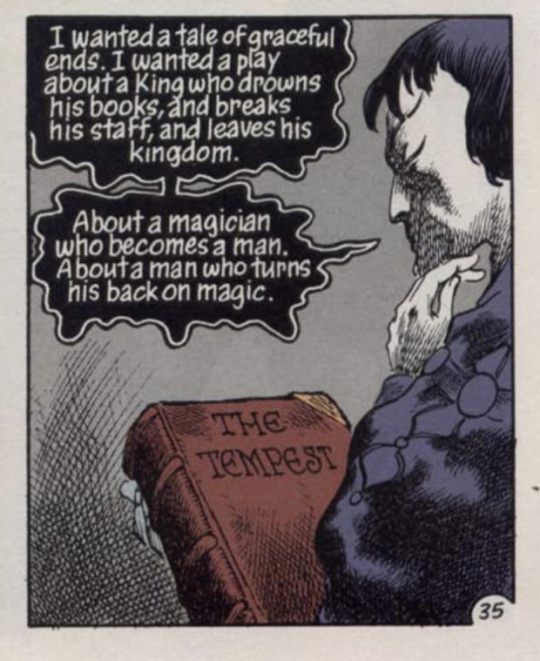
I personally think that the last three issues of The Sandman (#73-75) are in this order for a reason
I find it really hard to take Sunday Mourning/Hob’s dream and say:
”This is it, this is the end, he is a dream entity now and wanders off into the sunset with Hob” (and Destruction, but I’m not even go into that right now because I have too many thoughts on that one, so that might be a diff post altogether).
Yes, he (in one way or another) lives on in Hob’s memory/dreams. And also yes, it is the epilogue to The Wake and concludes it, but if what comes after didn't matter, it wouldn't exist. Everything matters when Neil Gaiman writes ;)
He also lives on because time is warped and not linear (#74, “Exiles”). You need to read it to understand it, and I won’t go into too much detail here because it will get too long. Suffice it to say that in Exiles, two things set in very different timelines happen at the same time for a person. So Morpheus can live on like that. Even if he is dead.
But I personally think the most important truth is to be found in The Tempest (#75). In my opinion, it is the last issue for a reason (otherwise, we could have just left on the note of Sunday Mourning). It’s about STORIES, and that stories live on forever. We come from them, and we RETURN to them. And Morpheus, the Prince of Stories himself, is now also a story - something he never wanted to acknowledge, but I'll get to that in a minute.
The Tempest is about the parallels between Morpheus and Prospero. Prospero gets to leave his island. Morpheus says he will never leave his.
From the epilogue to The Tempest (you can also read it on the last two pages of #75):
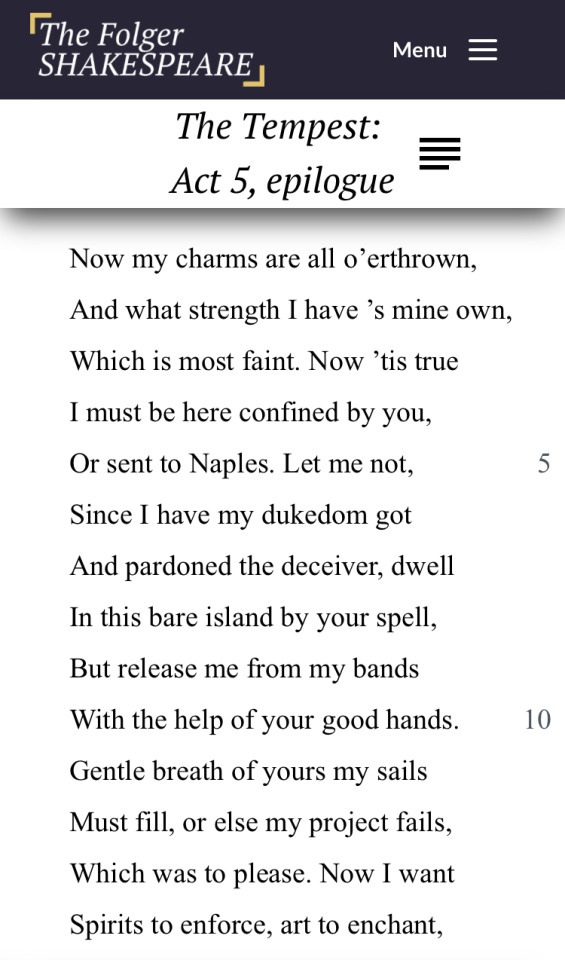

I think this is the most important bit (bold by me):
“Now I want spirits to enforce, art to enchant
And my ending is despair,
Unless I be relieved by prayer,
Which pierces so that it assaults
Mercy itself, and frees all faults.
As you from crimes would pardoned be
Let your indulgence set me free."
Dream IS Prospero here (although he tells Shakespeare he cannot/MAY not recognise himself in stories. The sad thing is that he won’t acknowledge he also has a story because he is so wrapped up in his sense of duty and responsibility).
Even after death (I repeat, this is the LAST ISSUE for a reason, and IMHO, we do not need to worry about when this takes place), he feels guilt. Just like Prospero in his epilogue.
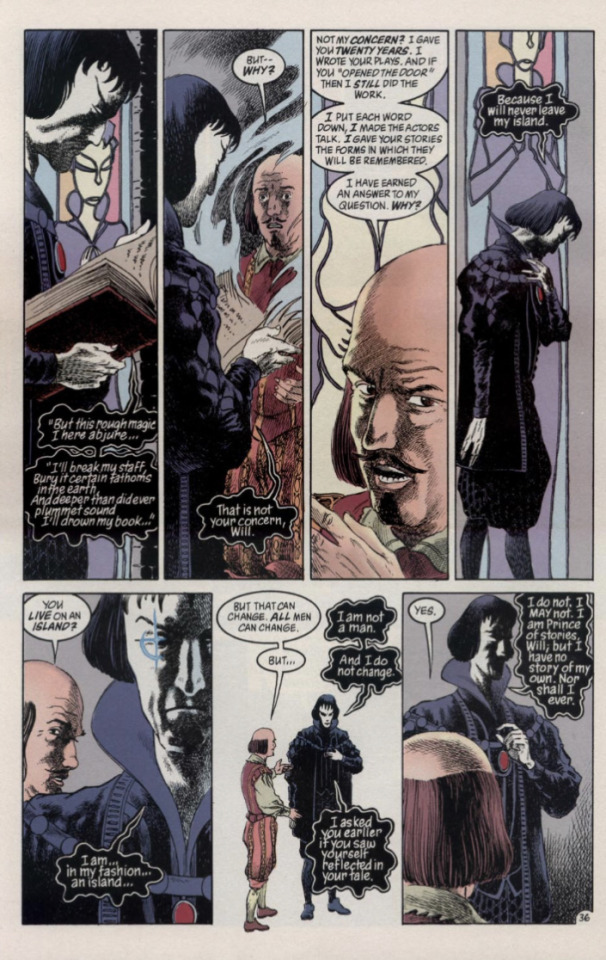
In my view (personal as it may be), existing as a dream entity, no matter in whose dream, with his memories intact (because that’s what I read so often when it comes to him having some sort of future in Hob's dream) would be absolute torture for Morpheus. It is largely what led him to give up in the first place. That’s why it leaves me… uncomfortable? Dissatisfied? I can’t quite put it into words, and I also totally get that these feelings are my problem.
I know some people like to see Sunday Mourning as a confirmation that he ultimately does leave his island, and maybe that’s also true in a way. But I personally cannot get over Shakespeare saying “All MEN can change”, and Morpheus replying that he is not a man (as in a mortal human). That men have stories, that men can change, but he cannot. Or even if he has changed ("I was no longer the same" #69), he still has obligations, so it ultimately can never be unless he dies. It is what he staunchly believes in, until the end.
This is how we leave the story in #75 - again, it doesn’t end in #73.
And while all three ways of “living” on (memories/dreams, warped time and story) are true in a way, the ultimate way he lives on is as a story in my view.
He lives on as someone who matters as the protagonist, who makes us feel, who isn’t just the narrator. And that's beautiful - to me even more beautiful than some straightforward, flat happy ending. But I appreciate that mileage might vary, and that people will see things differently, depending on their own experiences. (I first read the comics when they came out in the 80s/90s, and no matter how many times I re-read, I always find something new, I see things differently with the passing of time, and it never loses its grip on me).
We are the ones who forgive him - he will only be free if we do.
We see that he has changed, no matter if he believed he did or he didn't.
We, the audience (who were even at his wake; we are the last dreamer to wake up), are the ones who decide if it was “worth it”.
That’s how he leaves his island, and
That’s why “It is never just a dream” in my opinion…
I think @onehundredandeleventropicalfish also wrote on the topic a while back if I remember it correctly, but I can’t seem to find the post in question right now. I just remember I related a lot.
#sandman meta#sandman spoilers#sandman#morpheus#dream of the endless#the sandman#the wake#exiles#the tempest
120 notes
·
View notes
Note
salutations mr linkle the hyrule historian tumblr can u direct me 2 the last anon that said ur wrong bc i think they're great n I wanna give them a kiss on the lips!!!! anyway was it not u that said the OFFICIAL!!!!!!! 15 translation was wrong n bad so i dont think the opinions of anyone who considers rimbaud a doormat n wrote the abomination that is cherish are valid
anyway anon if ur reading this ilove u pooks u me n bitch tree anon n bully anon should b poly or smth we'd make beautiful children
Hmmmmmmmmmm, well I don’t remember anybody saying I was wrong, honey. 🤔 Last anon just asked me a question about if I’d ever considered something, and I answered! 😊
Anyway I’d love love love love to help you two hook up bc that’s so sweet and I want to meet your future children so much! 🥺💕💕💕 I could be a part of a real life love story! 🥺💖💖💖💕💕💕💕💕 So cute!!! I don’t think Bully anon or Bitch Tree anon would be into it unfortunately at first, since they send me little hearts and cutesie things these days…. I’m sorry about that. 😔 Oh well! I’m sure when they hear your dedication to reach out to me they’ll still want to give you kissies somehow ‘cause they’re so dedicated to me too, just in a very loving way.
And yee! I did say the ‘official’ translation was bad! Thank you so much for remembering my words and sticking around my blog so long. 🥺💕 Anyway yeah, that unfortunately happens sometimes, and by sometimes, I mean a lot, ‘cause a) there are people out there who unironically think it’s okay to take creative liberties in translating because it’s their right as someone taking the time to do it (can’t be assed rn but if you search around this site enough, you’ll find an entire thread of translators talking about this), b), there are people who write for a lot of series they’re not into and therefore aren’t aware of all the context of previous novels, c) there are people who just slip up and make mistakes! Happens all the time unfortunately and most people don’t understand that if you misunderstand or change one thing it can change everything, and d) people who are tasked with translating 99% of the time never even talk to the people team of people who actually published the original, much less are in contact with the author themself! Mistranslations and drastic creative liberties happen a lot for example in the fandom I came from (The Legend of Zelda), which you can see a bit here! And if you still don’t believe me, you can go ask Dear old Author Neil Gaiman, who has even had some of the characters in his books turned from lovers to sisters and everything, a lot of the time completely without his knowledge until fans point it out to him! If you scroll his blog, I’m sure you’ll find those posts for yourself, assuming he doesn’t see an ask from you on if it happens. ‘Tis a sad thing, but Asagiri-sensei likely doesn’t even know when a mistranslation happens, much less do these people sit down and ask him things directly before doing their thing. He certainly doesn’t have involvement overseeing the process; that’s an unreasonable thing to ask of someone when it involves other languages they may or may not even be fluent in. And all the proof we need that it’s wrong is that the JP novel and the Stage Play (both things that Asagiri was directly, heavily involved in and/or directly penned the words of/material of the script for himself) both contradict it. If you’d like to take on that claim, since you’re implying I’m wrong, have at it! The burden of proof is on you, so, I look forward to seeing you send me the individual JP source lines of the Eng translations you want to take a crack at defending and a long wall of educational text explaining why each part of the English translation got it 1,000% right, directly in my in-box. If not, have a good day ‘cause I’m sorry, but I got limited time and other things to do right now, baby. 💕 I’ll eventually get to it myself some day, but right now I have other articles to finish first, art to make, and a fic to keep posting.
Speaking of which…OMG YOU READ CHERISH? 🥺💕💕💕💖💖💕💕💖💕💕💖💖😊💖💕🥺💕🥺💕💖💕💕🥺💕💖💕💕💕 That’s so sweet OMG OMG OMG! I’m glad you enjoy my beautiful ‘abomination’ enough to read and keep up with it! Don’t worry sweetie, the next chapter is on its way!
See this is why I love love love love love love love my ‘haters’ so fucking much, I adore y’all, I’d kill for y’all, OMG. You give me so much dedication and time, I know how much y’all adore me and I adore you right back! My beloved super fans. 💕💕💕💖💖💕💕💖💕💕💕💕🥺🥺🥺 Every ask I get and vague post I read makes my heart flutter, frfr, I’ve actually got an album I keep of screenshots of y’all’s posts to give me the motivation to keep doing what I do whenever I’m down. 🥺💖💖💕💕 This one goes in the collection for sure ahhhh 💖💖💕💕💕 I’m so important to people OMG IT’S SO CUTE AND SWEET
TAKE CARE OUT THERE ANON! PLS SEND ME MORE MESSAGES I LOVE THEM. I WAIT WITH BATED BREATH 💖💖💕💕💖💕💕💕💖💖
GOOD LUCK ON YOUR DATE!!! PLEASE MAKE BABIES WHO ARE ALSO OBSESSED WITH ME, I CAN’T WAIT 💕💕💕💖💖
#linklethehistorian#bungou stray dogs#bsd#my thoughts#thoughts#bsd novels#fifteen#arthur rimbaud#bsd arthur rimbaud#randou#official english translations#ask#anon#ily anon#THANK YOU SO MUCH FOR THINKING ABOUT ME OMG 💕💕💕💕#this ask made my day 🥺🥺💖💖💕💕💖#REASONS TO LIVE FR
6 notes
·
View notes
Text
wasteland, baby! | three: concerning the dreaming and your new companions (the coming of storms)
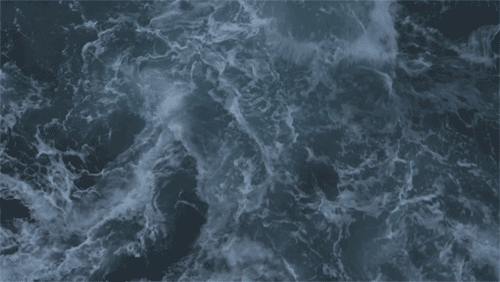
Summary: You spend a few weeks in the Dreaming and get to know your new friends. But something is wrong. Storms are coming.
Pairing: Dream of the Endless x Reader
Warnings: none
A/N: I will reitorate that there are MAJOR SPOILERS for The Sandman graphic novel series here. If you have not read “Fables and Reflections”, “Brief Lives”, “The Kindly Ones”, and “The Wake”, I would recommend you wait to read this until you have done so.
This chapter contains dialogue from Neil Gaiman's "The Sandman" issue 57.
Read the previous chapter: two | concerning your time spent away from the dreaming
wasteland, baby! masterlist
“Is it ready yet? Are you done?”
“Nearly. There we go. There we are. All ready for you to make into something wonderful.”
“That’s me darling girl…”
“What are you making him, then?”
“I can’t say that I’m entirely certain, my popsy. But it’s a fine yarn and I don’t doubt that it’ll suit.”
The next few weeks in the Dreaming are lovely.
When you started to get yourself used to The Dreaming, you toured with Lucienne, who accompanied you through the vast landscapes and sights that surrounded you.
You saw Fiddler’s Green again. He was happy to see you, and just as lovely as you remember. The bright green fields and streaming waterfalls and beautiful flowers were a sight for sore eyes: you grew to realize why travelers dream of that place.
You saw the Lake of Dawn, which was on one side of the Dreaming. A beautiful countryside lake, it was decorated with the morning sunrise and shades of pink, orange, yellow, baby blue, and gold. It looked like a painting, the colors of the sky all fading into one another.
The Mandrake Wood was a small forest of little plants. You were instructed to keep your hands off of them, or else they would either scream or give off a very weird smell that would’ve made you see things.
The Via Lacrimae was not a Road of Tears, contrary to what your studies had made you believe. It was a limitless sky filled with thousands of stars. Though it was beautiful, it gave you a terrible sense of loneliness and isolation. This, Lucienne told you, was a place where depression took hold of your dreams. You knew, without her saying, that somehow your cell, the place that you first saw Morpheus in years past, resided here.
The Archipelago, a series of small tropical islands, was so far away that you and Lucienne had to take a boat to cross the oceans to get to it. To you, the boat was much more modern and futuristic than you were used to, and it was very disorienting to look at. But Lucienne was patient, and described it as “a boat that humans use nowadays, in the current year.” The Archipelago itself was small and lonely, but still beautiful and almost neutral in atmosphere. It was a resting place.
The Love Fields were overwhelming. A frantic, shifting, loud, and passionate place like this would only exist in dreams. The sky and ground were the deepest red color, not dangerously so but the color of blush, the blush that spreads across the face and shoulders and chest when infatuated lovers are at their most vulnerable and intimate. The ‘fields’, as they were described, were not fields at all. They were bodies, naked bodies of all shapes and colors and sizes. Everywhere you looked, there were people fornicating, desperately and passionately. The sounds of moans and sighs and ecstatic cries were constant. You did not spend a long time there; the second-hand embarrassment was too strong.
Nightmare Country was on the other end of the Dreaming: a dark, desolate place with gray skies and stormy weather and barren, fruitless, dry ground. You saw many creatures there, the grotesque and the uncanny, the typical horrors of children such as clowns and spiders. You met Cain and Abel, the first murderer and the first victim, respectively. Cain was a snappy, sarcastic man with eyes like daggers, and Abel was a bulkier, gentler man with a severe stammer and watery blue eyes. You also met Goldie, the baby gargoyle who was equal parts ugly and adorable, and Gregory, the older gargoyle who resembled a very large puppy. You liked Abel immensely, but felt very wary and cautious around Cain, despite his reassurance that he would not hurt you.
The borders of the shifting zones were the last stop on your tour for the week. You saw the borders of Fiddler’s Green, a couple of schools and gas stations in the middle of nowhere, lonely houses that did not have any doors or windows, some mountains, and the desert sands. The liminal spaces, the uncanny valleys, these were the shifting zones. You did not get too close to any of them, lest they would suck you up and ensnare you.
A week later, you met Mervyn Pumpkinhead, Matthew, and Nuala. What Morpheus said was true: Mervyn Pumpkinhead is, in fact, a sentient scarecrow with a pumpkin for a head. Matthew is a raven, dark and smooth. Nuala is a small fairy, not beautiful but sweet, with pointed ears and wide brown eyes and tousled brown hair.
“So, uh, you one of Boss's new broads?” Mervyn had asked, a cigar smoking in his gloved hand. He inhaled from it, and exhaled the smoke from his nose… and his eyes, and his mouth.
“Mervyn,” Lucienne scolded.
“What?” Mervyn raised his hands in self defense. “It seems like yesterday that the Boss was getting over… uh, what was her name… I forget. Name of a region — Aeolia or something. I dunno. It's been a while since we've mentioned her though… or maybe it hasn't been. Time is so screwy here.”
“Lord Morpheus… had a lover?” you asked softly.
“A lover?” Mervyn laughed once, almost in a scoff. “Kid, he's had a few lovers. There was that princess from Africa, ten thousand years ago. There was… Killala, the cosmic being. There was that one woman who was made for him, literally. Don't ask, it didn't go well.” Mervyn paused. “None of 'em go well.”
“Maybe this one will,” Matthew chimed in.
“Guys,” you said bashfully, “I'm — I'm not one of Morpheus's new lovers. I'm just a visitor.”
“For a hundred years?” Matthew cawed. “I doubt he’s given that amount of time to any dreamer.”
“He just… felt bad that I was stuck for that long. I’m sure you would do the same if you were him.”
Nuala, the fairy, looked up at you with a kind smile, but there was something in her face that didn’t sit right. You couldn’t tell if she was scared or sad, or something else. “I’m sure he missed you terribly.” She looked down at her feet. “He must’ve been really sad when you were gone.”
You couldn’t deny what Nuala had said; you’d heard it yourself, from Morpheus. He did miss you terribly. But it wasn’t just you: there were others that went missing. You were sure he missed them just as much, if not more.
“It was awfully nice of him to bring you back though,” said Matthew, thankfully before you could figure out how to respond to Nuala. “Back when I first met him, he wouldn’t have done that. He would’ve left you there, I think. Something changed in between then and now. I don’t know what it is.”
Lucienne blinked.
“He doesn’t tell us much,” Matthew continued gravely. “We’re kinda… left in the dark a lot of the time. And y’know, I’ve been thinking, too… about certain things.”
“What are ya thinking?” asked Mervyn.
Matthew opened his beak to say something, but then he shut it. “It’s nothing… It's fine.”
He opened his wings and flew off, out of the library.
“Is he alright?” Nuala asked. “I’ve never seen him so… distraught.”
“I’m sure he’ll be alright,” Lucienne sighed. “This happens with Lord Morpheus’s ravens sometimes. They get worried when they haven’t seen him for a while. They get restless and can’t stay in one place for long.”
“When do you think we’ll see Morpheus again?” you asked.
“I’ve not the slightest clue. He’s on the shore, but he wouldn’t want to be disturbed while he’s working. He'll come back to us eventually. He always does.”
There is a river that runs through the Dreaming. It fluctuates between deep and shallow, choppy and still, depending on Morpheus’s mood. Today, you are sitting at the edge of the land there, your feet hanging over the site and lightly touching the water, which mostly still: a wave rises here and there, sometimes small, other times quite large. But they do not hurt you; they rise, and then they fall as quickly as they come.
He is uneasy, you think. But… about what?
Looking up at the castle in front of you, you shudder. The skies are becoming gray and storm clouds are rolling in, shrouding the Dreaming in a murky, dark blanket that does not seem secure at all . Something is happening.
A miniscule black dot swoops down from the air, and lands in front of the castle entrance. The castle itself is on top of a very high mountain. You are able to recognize the black dot as Matthew: he is talking to the Gatekeepers.
The Gatekeepers are the Griffin (a lion with an eagle’s head), the Wyvern (a dragon) and the Hippogriff (a winged horse). They are gigantic creatures mounted on marble platforms, towering over the equally gigantic entrance to the castle. They gaze at Matthew with the utmost neutrality, but they speak to him nonetheless. You cannot hear what is being said.
Morpheus is uneasy. Something’s wrong.
Standing up, you gaze at the storm clouds and look to your left. A long ways away, you can see a beach, a shoreline, and a lake that stretches on forever. The waters there are getting choppier.
Stupidly, perhaps, you begin to walk forward, towards the shore. Toward Morpheus.
It takes a while for you to get to the shore — it’s on the very edge of the Dreaming. A wind has risen and it seems to draw you backwards, as if keeping you from moving forward. Sand starts to get in your eyes. It reminds you of the shifting zones, and you fight the urge to sink to your knees and let yourself be buried.
“That’s not very nice of you,” you mutter into the air. “I know you may not want visitors right now but… I would like to see you.”
Two seconds pass, and the wind dies down. You are now able to see something far away on the shore, on an open plot of sand and surrounded by rocky cliff sides. A tall man with pale skin, covered in a dark cloak. He is surrounded by other humanoid figures.
Slowly, you begin to see him more clearly as you join him on the shore. He is… making… these figures around him: they are half-finished, some lacking faces or mouths or limbs. Some are disgusting and monstrous, almost like the nightmares of children… and others are normal looking, like the nightmares of adults. Some of the humanoid people are so normal looking that you would think they’re fellow dreamers, but something about them is off just enough that you are stricken with a sense of unease when you look at them.
There is one that stands out more than the others. A tall, young, naked man with white hair. His eyes are closed. He looks more finished than any of the other nightmares around you. Something about him looks waxy and dead, as if you were looking at a corpse, or even a mannequin. You recognize him, somehow… You don’t remember ever meeting him, but he looks like someone you may have passed on the street without ever paying him any mind — well, maybe you would have begun to date him, if he had asked. He is certainly handsome. But your attention lingers less on this man and more on Morpheus.
The Dream Lord is concentrating hard on his work. He is gazing with narrowed eyes at the man he is creating, and he shapes the man with his hands, altering the nose or the chin or the arms like clay.
Without turning away from his work, Morpheus addresses you. I apologize for that. Truly, I appreciate your presence. But why did you come here?
“Storm clouds are coming in. Merv and Matthew and Nuala are worried about you… I’m worried about you. Are you alright?”
Morpheus says nothing for a little bit. Then, he looks back at you. His eyes, usually starry and bright, are dim and tired. He looks shrunken, exhausted. I am… perfectly content. Thank you for asking.
“You’re… pardon me for saying, but you’re an awful liar. What’s wrong?”
Despite the comment, Morpheus offers you a tiny smile. You’ve found me out. Ah, I am just… thinking… about things. Or… trying not to. That is why I am so focused on my work. Do not trouble yourself with worry, dear one. I will be fine.
“What are you working on?” you ask.
A nightmare. I am… recreating him.
“Recreating? What happened to the old one?”
I uncreated him. He was… petty, and foolish. It was my error. I made him, unintentionally, to be too ambitious and too cold. Nightmares should be frightening, yes, but not malicious. They exist only to reveal a dreamer’s fears so that they may face them, not to cause fear and unrest for the pleasure of it. He will be a protector now.
“Nightmares reveal a dreamer’s fears. Can I ask you what my nightmares mean?"
Morpheus stops what he’s doing and puts his hands in his jean pockets. Thunder rumbles in the clouds.
Some time ago, I was asked to interpret someone’s dreams. He asked me, “I was floating on the sea, calling my wife’s name. What does it mean?” This was when I was cold and ruthless and distant, and I told him, “Am I a hedge wizard, that I should interpret your dreams for you? Dreams are composed of many things… images and hopes, fears and memories. Memories of the past and memories of the future.” I did not tell him what his dreams meant, and this inaction caused him to be unprepared for what awaited him in the near future. He was… distraught… by my unwillingness to let him know. But I did not indulge him.
I shall, contrarily, indulge you. First, what do you think your nightmares meant?
“The fear of solitude.”
You would be correct, but that is not all. You are afraid of cruelty and neglect, and you are afraid of those you love rejecting you. Your cell was a manifestation of that fear.
“Why did you save me?”
From your nightmares? I am not cruel. This nightmare was overperforming, much like the nightmare you see standing before us. He had done his duty, but… he had done it for the pleasure of it. The Corinthian, before I uncreated him, had swayed more than just mortals in his ideology of fear. He had persuaded other nightmares, too. That will not happen again.
“Do you do that often? Save people from their nightmares?”
Often? Define ‘often’. There are trillions upon trillions of beings in the universe. Morpheus grins. They all dream. I would not want you to trouble yourself with the amount of times I have… interfered… in the nightmares that overstep their bounds. It happens more times and more frequently than the human mind can comprehend.
“Oh.”
It seems like the thunder has quieted down, and the gray skies have become just a bit lighter. You feel content there, with Morpheus, on the sands of the Dreaming.
Morpheus turns and looks across the sands. Someone is coming, he says suddenly. I did not send for anybody. His voice is tight. I shall send you to the castle. I will rejoin you shortly.
“What?”
A raven caws.
Once more, in the way of dreams, you are instantly in what seems to be a broom closet of a kind. It is a small, cluttered room with various kinds of brushes and construction equipment. The room does not smell very nice, either. Delicately, you step over the equipment and make your way to the doorway. Turning the knob, you exit the janitor’s closet and find yourself in the castle, in the North wing. The door has a sign on it that reads: JANITOR’S CLOSET. A piece of paper below the sign contains the words ONCE MORE UNTO THE BREACH. MERV PUMPKINHEAD. in crudely scrawled capital letters.
You are not alone at the moment. You are surrounded by different creatures; servants of Dream’s, perhaps, or citizens of the Dreaming with free roam.
Nuala the fairy runs past you, the soles of her bare feet slapping the cold floor. It almost looks like she’s not quite touching the ground, but it could just be your mind playing tricks. She looks scared.
“Nuala?” you ask. “What is it?”
She does not answer you. She disappears around a corner.
You look around. None of the other creatures appear to be under the same stress. They walk leisurely in the castle halls, without a care in the world.
You don’t know where to go. You could go… pretty much anywhere. You pick a direction — to your left — and follow the hall. Down steps and through the labyrinth of the castle, you slowly arrive at a part of the castle that you have not seen before.
It is a long, wide, dark room with nothing in it except seven wall decorations: they look like mirrors, or maybe picture frames. Elaborate gold borders surround circular spaces, and almost all of these spaces each hold an item: in the first, you see a large, worn, dusty book. In the second, a small silver ankh. In the third, a mirror. In the fourth, nothing. In the fifth, a red jewel that almost looks like a heart. In the sixth, a tiny ring with a sharp fish-hook on it. In the seventh, a misty and unstable swirl of floating color.
Something about both the heart and the ring intrigues you. You step forward silently, making your way to them. Your feet make no sound on the floor below you.
Your fingers brush the smooth surface of the heart.
You are standing in a wide, smooth corridor colored the deepest red. The surface of the corridor — the floor and walls and ceiling — is the same the whole way through. It looks like a cave of sorts, but you have no trouble seeing.
It looks like the room you were just in, with its own wall frames and items. But there is a person laying on what looks like a couch in front of you. They face away from you, but they speak to you:
“My, my, this is a lovely surprise, don’t you think? I haven’t had visitors since… well, since my sister gave me this.”
The person holds up a tiny red flower in a beautifully manicured hand. He, or she, or… whoever… does not turn to look at you.
The voice is sultry and seductive, buttery and dangerous. You cannot place if it is a male or female voice. Sometimes, it is deep and sensual, like a man’s, and other times it is lighter and more mischievous, like a young woman’s. You do know that it holds power, and the power that it holds is dangerous and sharp, like a knife’s edge.
“You’ve wandered here on your own accord. You wanted to come here.”
You feel compelled to step closer, and you do. It’s almost involuntary.
Did I want to come here? you think. I don’t…
“You did. I should know. I am wanting. Maybe it was curiosity, or maybe not. Maybe you had a feeling, deep down, in your heart, exactly what that glass heart meant. What it means for you.”
Your mouth has gone dry and you cannot muster up any words to speak. As you hear this person talk, you realize that everything they are saying is true, even if you have no idea what any of it means. This person is like Morpheus. This person knows you, knows you more intimately than you'd ever know. But there is a danger here, that knife-like sense, that keeps you from being comfortable with it.
“What does it mean?” you manage.
The person chuckles, and it's a sound that sends a shiver down your spine. “Wouldn't you like to know? I can't tell you that, sweet thing. That would ruin the fun of it. You'll know soon enough.”
The person turns around and looks you in the eyes.
You are looking at the most beautiful person you have ever seen. Whether they are a man or a woman… you cannot tell, and you don't care. Beautiful tawny eyes the color of yellow wine. Deep maroon lipstick and dark eyeliner. Their skin is pale like smoke. You suddenly smell summer peaches, and your mouth waters. Somehow, though you cannot tell why, you know that to see this person is to love them.
But… you don't.
You see them, right in front of you. You know that to look in these yellow eyes is to forsake anything else, leading to your ruin or your triumph. But you are doing just that — looking into the yellow eyes — and you hold your composure. You do not fall in love.
And that's when it hits you.
You know. You know who this person is.
Desire.
Dream has family, you think, swallowing thickly.
“My big brother has quite a large family, actually,” Desire says nonchalantly. “You've already met his son. Pity how he turned out.” Desire's face scrunches up in confusion. “It seems to me… that my brother's influence has gotten to you. Normally, any mortal would be begging on their knees for me to even glance at them.” They scoff, an amused smile on their face. “He must be really wrecked for you.”
“What are you talking about?”
Desire shrugs, their smile fading into an expression of disinterest. “It wouldn't matter even if I told you. It won't last.”
“This is about — Dream?” you ask, trying to make sense of what Desire is saying.
“Things are always about Dream,” they mutter. “Even me. I don't like it.”
“I don't understand.”
“Mortals rarely understand anything. But, if anyone asks… if Dream asks… I don't have anything to do with anything that's going on right now. But deep down, he knows that. And you'll know that soon enough, too.” Desire smiles. It is, like everything else about Desire, knife-like and sharp.
But their eyes…
Their beautiful yellow eyes are screaming.
Desire's eyes twitch, and they spill over with tears. The smile, all happy and mischievous, stays the same. “You poor thing. I'm starting to like where things are going. It's a pity it's going to end.”
They wave a hand and you feel a lurch as you are yanked backward by a very strong, invisible force.
You're back in the long room of Dream's castle. You are holding the glass heart with both hands, and immediately upon recognizing it, you frantically put it back on the wall. Biting your lip, you slowly back away from the heart, keeping your eyes locked on it.
Your back meets a body and you whip around with a frightened yelp.
It is Dream. His eyes are soft and concerned. What did you see?
You're panicking. “I'm sorry — I didn't mean to go anywhere, I was just —”
Dream shushes you, and the sound is soothing and quieting. It sounds like an invitation to sleep, a soft lull that slowly brings you down into the bliss of unconsciousness. He takes a hand in yours and swipes his thumb over your skin. His voice is so, so soft. I am not asking for an apology. What did you see?
“I saw Desire,” you whisper.
Dream instantly tenses up. His eyes are wide and pained, and he glances over at the glass heart on the wall.
But then his eyes go to yours again. It is no matter. Please, dear, do not trouble yourself with this. I shall deal with my sibling in my own time. Desire should know by now not to meddle in my affairs.
“Your — your affairs?”
You are a guest in the Dreaming. My guest. You are under my protection for as long as you live. This is an affair of mine.
Morpheus's hand moves up to stroke your cheek, as if you were a little child. Desire will not harm you again. This I swear.
“Desire didn't — didn't hurt me.”
Dream's eyes are piercing then, but his harsh gaze is, once again, not directed towards you.
Yes, they did.
#wasteland baby!#the sandman#the sandman fanfiction#the sandman spoilers#the sandman comics spoilers#morpheus x reader#morpheus sandman#morpheus the sandman#lord morpheus#morpheus#morpheus of the endless#dream x reader#dream of the endless#dream sandman#fanfiction#netflix sandman
27 notes
·
View notes